#Dr. Nicholas Romanov
Text
姿勢跑法的主要元素

事情看起來完全是他本來的樣子,但在表象之下⋯⋯空無一物。——尚保羅.沙特 (Jean-Paul Sartre,法國哲學家)
姿勢跑法的主要目標是駕馭重力,因為重力是使身體向前移動的動力來源。跑步時,我們是透過關鍵跑姿→落下→拉起的順序來運用重力(圖1)。
◎ 加入慢跑俱樂部粉絲專頁,設定「最愛」掌握最新體育資訊!
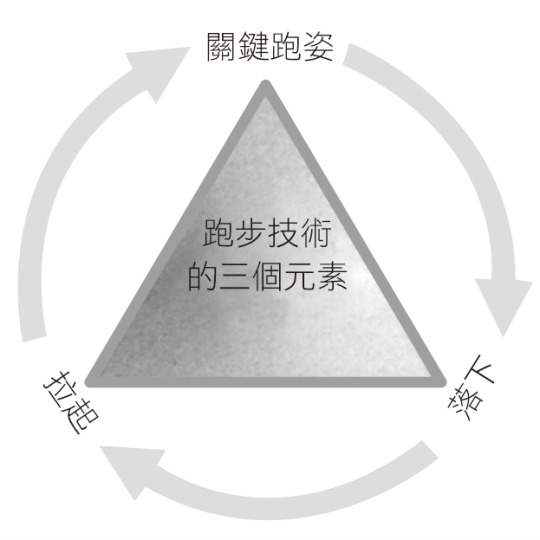
圖1 ➲ 任何跑者都必然會經過「關鍵跑姿→落下→拉起」這三個元素,所以姿勢跑法的訓練非常重視專注力,必須把注意力放在這三個元素上,其他動作都是這三個元素所形成的結果,例如手臂與腿部的擺動範圍。
是跑者支撐體重的最佳姿勢,接著「落下」是跑者運用重力向前移動的主要動力,最後把腳掌從地面「拉起」以盡快回到下一個關鍵跑姿。

圖2 ➲ 在輕快配速下的關鍵跑姿。請注意,腳掌離地的高度跟跑步的速度有關。
觀看跑步影片時,你可以利用分段暫停的方式來分析影片,當跑者的騰空腳在膝蓋附近,支撐腳以前腳掌的蹠球部支撐在地面上時,正是我所謂的「關鍵跑姿」,此時支撐腿的膝蓋微彎,身體呈S 形,腳上正承擔著一步之中最大的體重(圖2)。此刻跑者的身體正處在準備向前落下的關鍵時期,只要一股微小的力量就能使它向前失去平衡。這股微小的力量可以來自外部的重力,或是藉由內部肌肉張力的釋放,使身體改變姿勢而向前落下,跑步動作就此發生(圖3)。
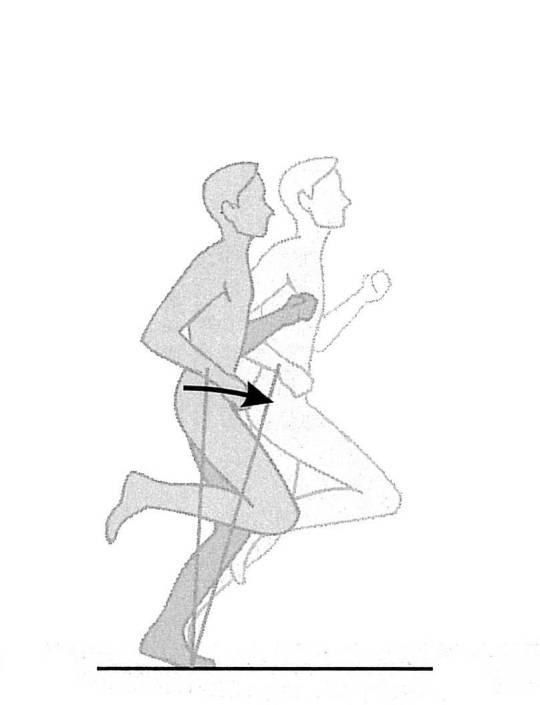
圖3 ➲ 允許身體在重力的牽引下,朝你的目標方向自然「落下」。
所以向前跑,就是「允許」身體不斷向前「落下」的過程,強調「允許」是因為我們無法強迫落下發生,我們只能讓落下自然發生。落下是重力造成的,它會使身體同時向下和向前加速。如果每一次的落下角度都一樣,而且每一步都能盡量減少著地的剎車效應,這股加速度就能使身體維持等速移動。
姿勢跑法的最後一項元素是「拉起」。當體重通過支撐點後,立刻拉起支撐腳,使腳掌離地(圖4),身體騰空後必須快速重建平衡,作為回到關鍵跑姿與落下的準備。當體重離開支撐點的正上方後,腳掌也沒有理由再留在地面上。在落下階段,切忌為了增加落下速度而用肌肉主動發力,因為人體是無法主動加速落下,所以不管多用力都只是浪費力氣而已。
向前落下是跑步加速度的唯一來源,落下時要像木桿向前傾倒一樣,姿勢不能跑掉,必須維持住緊密的整體性。

圖4 ➲ 在拉起階段,前腳也同時落下,但它純粹只是受到重力而向下落,落下的過程中前腳絕不能主動向前或向下施力,跑者只需專心拉起後腳就好。落下動作會自然發生。
腿部任何用力「推蹬」地面的用力動作都會導致身體向上移動,這即是垂直振幅過大的主因,它同時會對身體水平速度造成負面影響。有些人認為下肢(髖膝踝)三關節伸展的動作有助加速,所以才想要推蹬,但這並不符合力學的邏輯。
為了說明清楚,我們引用較為生硬的運科術語—地面反作用力的向量。瑪格里亞(Margaria)研究發現,在支撐結束時此向量與地面的最小夾角大約是63.5° ;此外,頂尖跑者的垂直振幅都在4~6公分之間,而且身體的質心只會產生2~3° 的「水平位移角」(圖5)。
刻意用力「推蹬」會使水平位移角度大於身體所需,使身體偏離上述的最佳水平軌跡。從這點來看就無法支持推蹬的理論。此外,當我們從跑步時肌肉部位活動的數據來看(肌電圖),傳統認為在推蹬期該用力推蹬的肌肉(像是股四頭肌)都沒有反應,再次證明推蹬是多餘且沒有實際效益的動作。因為伸展肌群的主要用力時機不在伸展期,而是在關節彎曲的支撐期,當下肢的肌肉伸展時身體已經失重,體重不在了肌肉就無須再用力,這現象被運動科學家稱為「伸肌悖論」。
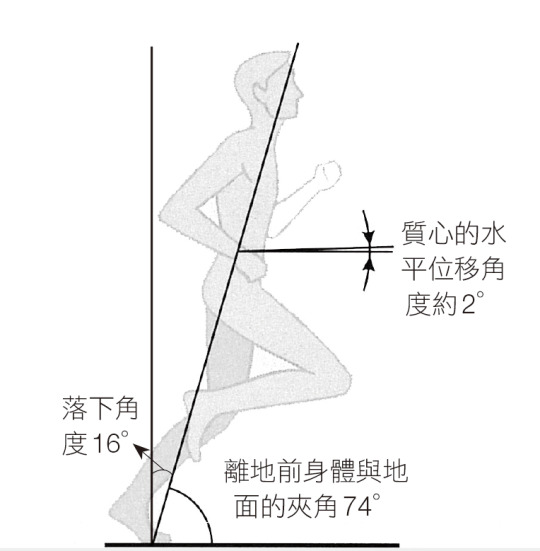
圖5 ➲ 圖中為跑者在支撐結束前的落下角度,想跑得愈快,就必須維持較大的角度與步頻。「推蹬」的動作會延長觸地時間與拖慢步頻。
跑步時不用推蹬,真正需要專心注意的動作是把腳掌從地面「拉起」。在姿勢跑法的教學模型裡,跑者只要考慮腳掌在臀部下方上下移動的幅度,專注在拉起,而非拉回。雖然在外人看來,跑者是把腳從後方拉回臀部下方,但只要「即時拉起」腳掌就會很快回到臀部下方,快到根本察覺不出來;所以,當跑者的動作正確時,在心裡只會感覺到腳掌是直上直下的動作,就像在原地跑一樣。換句話說,只要跑者感覺需要把腳掌從後方拉回,就代表腿尾巴形成,一定有某些地方做錯了。這就是旁觀者的描述與跑者本身對動作的感受之間最大的差異。
從力學上來說,旁觀者所見的腳掌軌跡是一弧形,這是騰空腳實際上的動作沒錯,但它是慣性所造成的被動結果,並非主動用後腳畫出一個弧形。在跑者的主觀意識中,只要拉起腳掌即可。
我們無須知道是哪一塊肌肉用力,我們需要知道的是要移動身體的哪一部分,以及何時移動。當該部分的身體移動時,負責該動作的肌肉自然會正確用力;換句話說,我們所要下達的指令是「拉起腳掌」,後大腿和其他相關肌群自然會完成任務,腳掌也會自動形成最佳的軌跡。
即使我們碰巧知道拉起腳掌主要是靠後大腿的膕旁肌,但在跑步時我們不用刻意收縮該肌群,只需想著拉起腳掌的動作。問題常發生在錯誤的動作指令,像是「抬膝」或「把腿往前送」,這種錯誤的動作會導致力學效率低落並提高受傷風險。
所以,正確的做法就是姿勢跑法中三個元素的簡單循環:關鍵跑姿→落下→拉起。然而,簡單的元素不代表學起來很容易,要完全練會並不簡單。
從理解姿勢跑法的簡單概念到實際練會之間,有一道很高的「知覺」門檻。我們已經在第四章仔細討論過知覺的意涵,以及在學習動作時它所扮演的角色。知覺,是大腦的工作,它的運作過程很複雜,包括透過感官所接收的外在訊息,接著進行分析、評估與存進記憶庫。為了執行跑步動作中三個簡單的元素,大腦會在預測未來的同時權衡思想、欲求、過去的動作記憶,以及量測心中的恐懼與遲疑,而且持續比較與下結論,最終才會依據身體的狀態決定該採取什麼行動,這些過程都在極短的時間內發生。知覺運作的過程即是一種從氾濫的資訊中挑選出適當訊息與採取適當行動的能力。
外在環境與內在思緒會同時帶來龐大的資訊,這些資訊會不斷轟炸我們的感官,但絕大多數的資訊都像耳邊風,沒機會被認識與感知到就消失了。我們稱它為「知覺閾值」,在每一個當下我們的大腦只能處理一定的資訊量,超過了就會過載。
問題是,大腦處理這些訊息的優先順序和程序為何呢?人類在經過數千年的發展過程中,心智已經演化到能挑出特定的訊息,再替它們排出優先順序。這些具有優先權的訊息通常跟身體的健康和生存密切相關。心智會先權衡所有的資訊之後再根據所處的環境下決定採取行動。
為了把這些化約成比較容易理解的圖象,我們現在來設想一種情況:你為了一場即將到來的鐵人賽準備出門練跑,但這個星期的訓練量很大,特別煎熬,你的訓練動機低落。你在心裡已經默默地把這點納入考量,想要放慢速度輕鬆跑就好。但正當你熱身剛結束打算慢跑時,一隻大狗邊吠邊朝你衝過來,此時求生的念頭瞬間攻占你的意識,所有盤聚在心裡的思緒與想要放慢速度的想法被拋在腦後,你立刻決定加速快跑。
在這種情況下,很容易跑出驚人的速度。求生的本能比你想要在下一場比賽中跑出好成績的驅動力大得多。想跑好的挑戰正在那裡。贏得比賽對生存來說並非至關重要,想要贏或跑得好只是你眾多欲求中的一種,欲求最終能否達到滿足取決於你的專注度與決心。
身為一位運動員,你每一秒都在決定該做還是不該做這個動作,在運動過程中這些決定都是獨自完成的。以跑步來說,這些動作非常簡單,就是關鍵跑姿、落下與拉起,但是要一而再、再而三地精確重複這些動作,就必須具備強烈的決心與持續的專注度。
在跑步時必須保持專注與持續採取的行動即是:有意識地使體重向前落下,以及在正確的時間點把腳掌從地面拉起的動作。聽起來很簡單,但學起來可是一大挑戰。接下來幾章要進入實務演練階段,目的就是要使你內在的心智與外在的動作都能專注在高效率的跑步姿勢上。
參考資料:
(1) Margaria, R. Biomechanics and Energetics of Muscular Exercise. Oxford niversity Press, 1976, pp.127-128.
(2) McClay, Lake, and Cavanagh The Extensor Paradox Experiment. In iomechanics of Distance Running. Human Kinetics, 1990, pp.129-186.

本文選自 出版社《Pose Method 鐵人三項技術全書》一書。
《Pose Method 鐵人三項技術全書》由國際知名的尼可拉斯.羅曼諾夫博士(Dr. Nicholas Romanov)精心打造,是一本運動技術的革命性教材。以「Pose Method 」為基礎,深刻揭示運動的本質,將重力視為主要推進力,重新定義了游泳、騎自行車和跑步的運動技巧。
書中從基本原理入手,清晰易懂地解釋了運動力學概念,透過大量的實證研究結果和博士多年的教學實戰經驗,呈現了一套獨特的運動教學理論與訓練法。無論你是運動教練或愛好者,這本書都將幫助你突破個人極限,以最有效率、最符合生物力學的方式執行運動動作。
◎ 書籍資訊:Pose Method 鐵人三項技術全書
◎ 延伸閱讀:培養自律與恆毅力的習慣
◎ 加入慢跑俱樂部粉絲專頁,設定「最愛」掌握最新體育資訊!
#Pose Method 鐵人三項技術全書#臉譜出版#尼可拉斯.羅曼諾夫博士#Dr. Nicholas Romanov#約翰.羅伯遜#John Robson#善用重力與運動力學#掌握關鍵姿勢#開發技術知覺#借力使力#效率極大化且不易受傷的科學化訓練全解析#慢跑俱樂部#書籍#book#books#fitness#sports#yahoo#慢跑
0 notes
Text

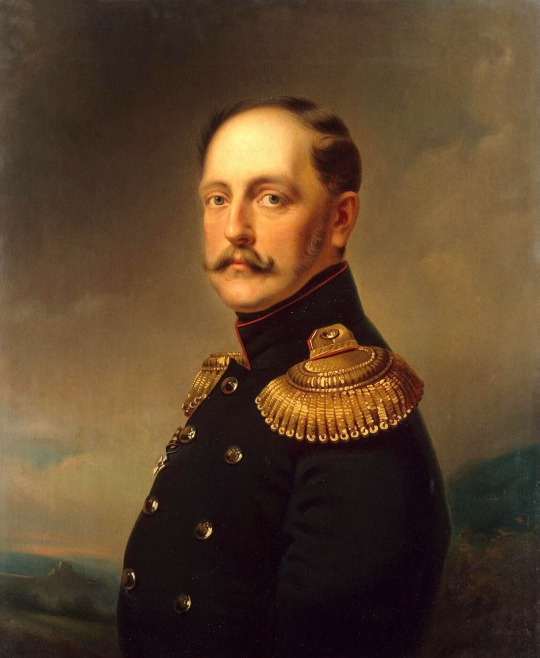
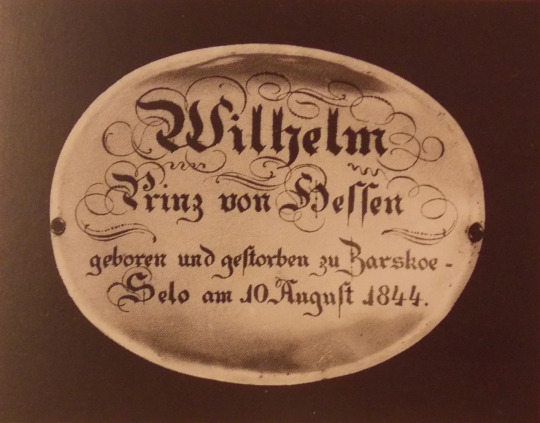
“At 7 in the morning, the first signs of premature birth occurred.
At 8 o'clock the distinguished young woman [Grand Duchess Alexandra Nikolaevna] took Holy Communion according to the rite of the Greek Church. Her confessor had demanded to see her, and so the Grand Duchess' desire for the ordinance was brought about in a natural way. According to the custom of the Greek religion, the sick woman asked not only her parents present but also her husband's forgiveness for any slights. This was so touching for the young gentleman, who was not used to this ecclesiastical form, that he knelt by the bed and also asked for forgiveness for any worries that he had caused her during the short time of their marriage.
An hour later she gave birth almost painlessly and unusually easily to a boy who screamed loudly and audibly, although he was only 25 weeks old. I went with the child and all members of the august family, except her father and mother, into the next room, where I wrapped him in warm cotton wool to await the baptism. All the members gradually approached the basket to see their sister's child . The prince [Friedrich Wilhelm of Hesse-Kassel] also approached and seemed deeply touched with fatherly joy, which dwindled with each passing moment.”
A Protestant priest had been sent to perform the baptism. However, when he had not arrived after three quarters of an hour, and the weak spark of life threatened to go out at any moment, the fear arose in the entire circle of those present that the child might die without the sacrament of baptism. Someone, I think it was the Duke of Leuchtenberg, had opened the door of the sick room and saw the emperor kneeling beside the bed. No one dared to disturb this moment, and yet danger was imminent.
I handed over the care of the young prince to a very capable chambermaid, entered the mother's room and actually saw the emperor [Nicholas I] at her bedside, holding both of her hands in his in a half-kneeling position.
To get his attention I made a small noise, but he would not look up, and I was forced to wave. He immediately got up, came toward me, led me to the doorway and asked,
“What do you want?”
“The child is in danger of dying any minute; the clergyman has not come. Does Your Majesty wish to baptize your grandson yourself, lest he die without the ordinance?”
“Yes, yes. Certainly.”
The emperor immediately went into the next room and entered the circle of his family surrounding the basket with the child. When the bowl of water was given to him as ordered, he performed the baptism with a dignity and emotion that made the deepest impression on me. Everyone knelt around the great emperor, who was baptizing his youngest grandchild. Then, without another word, he left the room and returned to his daughter’s bedside.
After a good half hour the summoned clergyman finally appeared in full regalia, decorated with several medals. The child was barely alive; but he performed the baptism according to the regulations of the Protestant church.
Of these two baptisms, that of the grandfather of his grandson was certainly recorded in heaven.”
— Imperial physician Dr. Martin von Mandt on the premature birth of Prince Wilhelm of Hesse-Kassel, the short-lived son of Grand Duchess Alexandra Nikolaevna of Russia.”
#dr. martin von mandt#grand duchess alexandra nikolaevna#prince wilhelm of hesse-kassel#emperor nicholas i#romanov#russia#quotes
73 notes
·
View notes
Text
105 years ago, on the night of 16/17 July 1918, the Romanov family and their attendants were killed in Ekaterinburg.
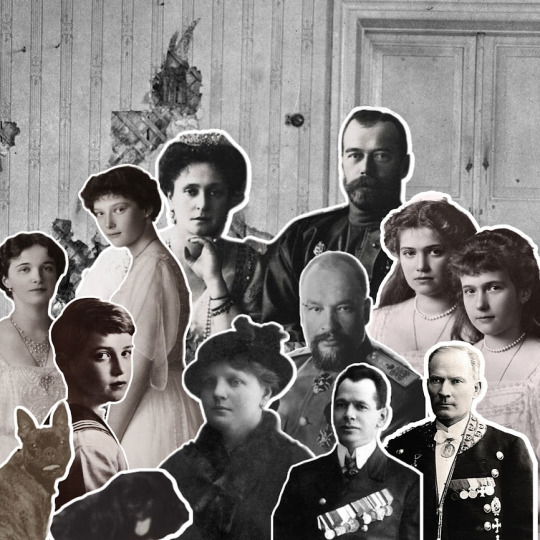
Pierre Gilliard, the beloved tutor of the imperial children, was one of the first people to enter the Ipatiev House after the murders. As part of the Sokolov Investigation into the crime and the subsequent media frenzy, he gave these statements:
“…the stoves; they were all full of various burned articles. I recognised a considerable number of burned things such as tooth- and hair-brushes, pins and a number of small things bearing the initials: "A. F." [Alexandra Feodorovna.]”
"I then went to the lower storey, the greater part of which was a basement. I entered with intense emotion the room in which, perhaps, they had died. Its aspect was most sinister. Daylight came in through a window with iron bars across it. The walls and the floor bore marks of bullets and bayonet thrusts. It was quite obvious that a dreadful crime had been committed there, and that several people had been killed.
In my despair believed that the Emperor had perished, and, that being the case, I could not believe the Empress had survived him… Yes, it was quite possible that they had both been killed. And the children? Had they also been massacred? I could not believe it. The idea was too horrible. And yet everything seemed to prove that the victims had been numerous."
Nicholas II Alexandrovich Romanov (1868-1918)
Alexandra Feodorovna Romanova (1872-1918)
Olga Nikolaevna Romanova (1895-1918)
Tatiana Nikolaevna Romanova (1897-1918)
Maria Nikolaevna Romanova (1899-1918)
Anastasia Nikolaevna Romanova (1901-1918)
Alexei Nikolaevich Romanov (1904-1918)
Dr. Evgeny Sergeievich Botkin (1865-1918)
Anna Stepanova Demidova (1878-1918)
Ivan Mikhailovich Kharitonov (1872-1918)
Alexei Aloise Egorovich Trupp (1856-1918)
Ortipo (1914-1918)
Jimmy (1915-1918)
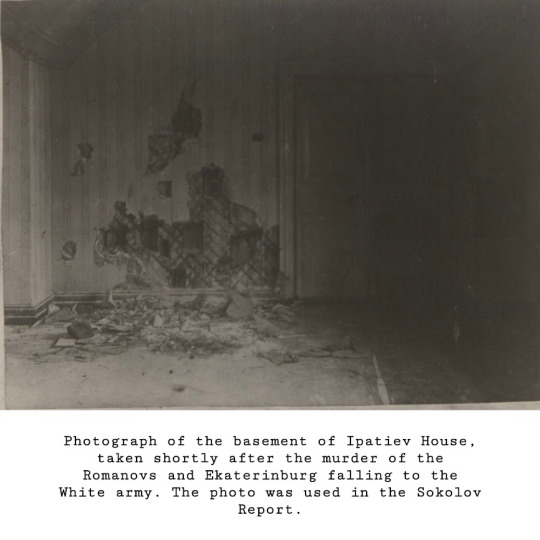




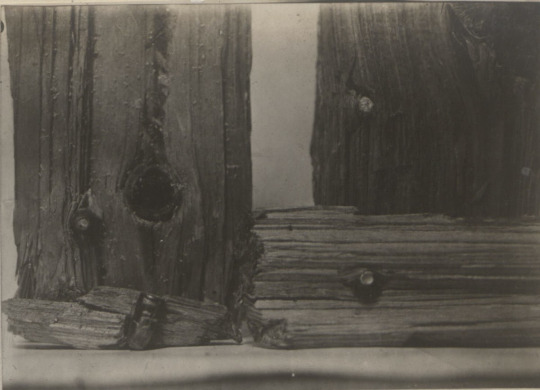

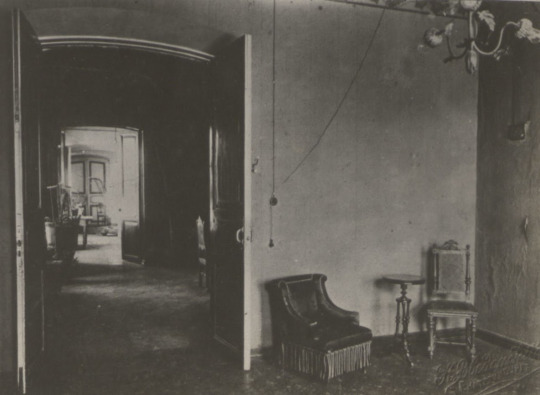


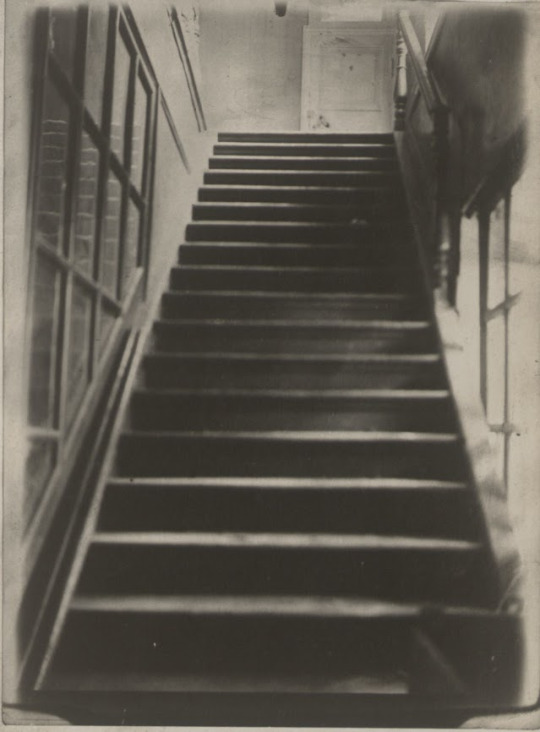
SOURCES:
The Last Days of the Romanovs, Telberg, Wilton, Sokolov. The Crime of Ekaterinburg, Illustrated London News
#olga nikolaevna#tatiana nikolaevna#maria nikolaevna#anastasia nikolaevna#alexei nikolaevich#Tsar Nicholas II#Alexandra Feodorovna#Alexei Trupp#Aloise Trupp#Anna Demidova#Dr. Botkin#Evgeny Botkin#Ivan Kharitonov#Jimmy#Ortipo#OTMA#NAOTMAA#Romanov family#Russian history#imperial russia#Ipatiev House#Ekaterinburg#Nikolai Sokolov#Sokolov Report#sources#Pierre Gilliard#my own
104 notes
·
View notes
Text
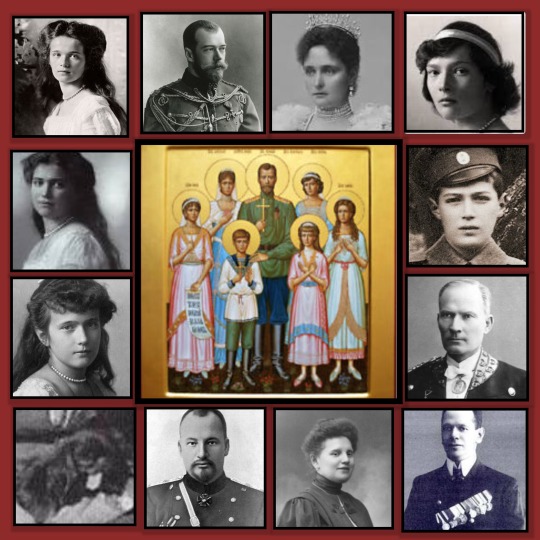
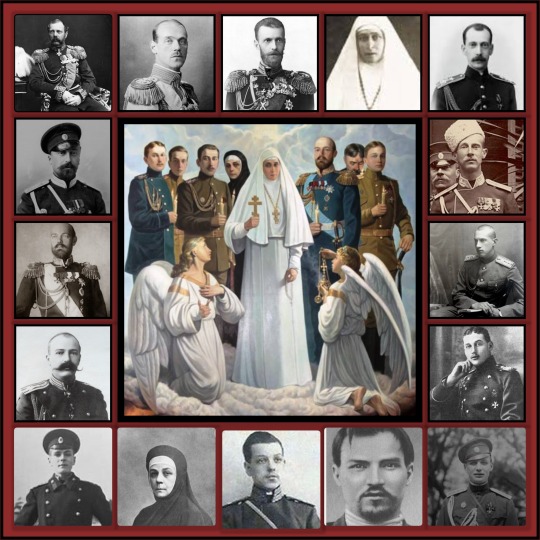
The Romanov Martyrs
I wanted to put together a little memorial that included all the members of the Romanov Family (as well as the members of their staff) that were murdered by the Bolshevik terrorists. This seems like a good week to keep them in our minds. Although we love and mourn the children especially, there were others we cannot forget.
Tsar Alexandre II was hunted down until finally blown to pieces.
Dowager Empress Maria Feodorovna lost two sons and five grandchildren (no wonder she could not accept they were dead)
Grand Duke Sergei Alexandrovich was also hunted down and blown to pieces
Three Mikhailovichi brothers were murdered
Four Konstantinovichi were murdered, three of them brothers; I cannot imagine what their mother, Grand Duchess Elizabeth Mavrikievna, went through...and so on.
May they rest in peace.
#russian history#imperial russia#romanov family#Nicholas II#Tsar Alexander II#Empress Alexandra Feodorovna#Grand Duchess Elizabeth Feodorovna#OTMAA#Grand Duke Mikhail Alexandrovich#Grand Duke Sergei Alexandrovich#Grand Duke Pavel Alexandrovich#Grand Duke Nicholas Mikhailovich#Grand Duke Georgiy Mikhailovich#Grand Duke Sergei Mikhailovich#Grand Duke Dmitry Konstantinovich#Prince Ioann Konstantinovich#Prince Igor Konstantinovich#Prince Konstantin Konstantinovich#Dr. Eugene Botkin#Anna Demidova#ivan karitonov#Akexei Trupp#Sister Varvara Yakolevna#Feodor Remez#mr. johnson
71 notes
·
View notes
Photo
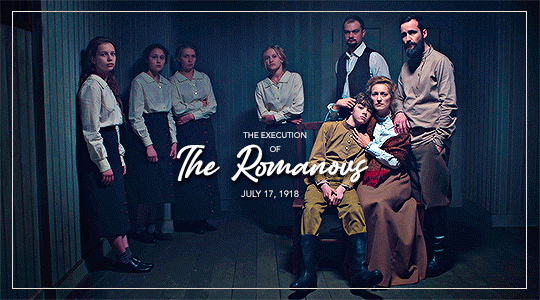
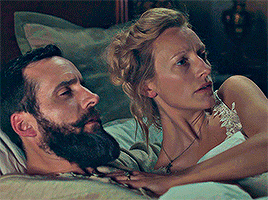
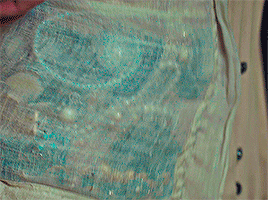

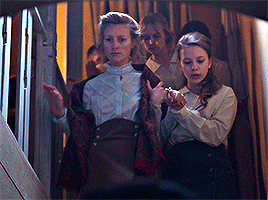
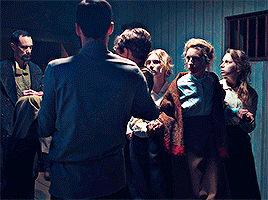
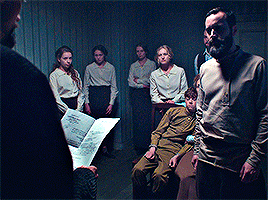
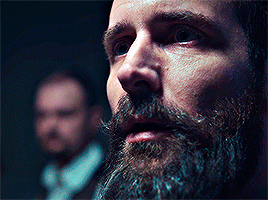
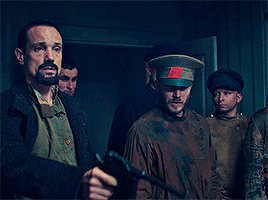
History meme
[6/8] Moments: The execution of Russia’s last imperial family (July 17, 1918)
[...] in the early hours of the morning of Wednesday 17 July, they [the Romanovs] were unexpectedly awoken by their captors and ordered to dress (The Romanov Sisters: The Lost Lives of the Daughters of Nicholas and Alexandra by Helen Rappaport).
In their bedroom, the girls carefully slipped into their jewel-lined camisoles, making sure every tiny eye hook was securely fastened before donning their plain white blouses and black skirts. Alexei, too, put on an undershirt concealing gems, while Alexandra tied a cloth belt containing several rows of large pearls around her waist (The Family Romanov: Murder, Rebellion, and the Fall of Imperial Russia by Candace Fleming).
[The family was] Told that they were being moved downstairs for their safety from unrest and artillery fire in the city, they complied without question. In an orderly line Nicholas, Alexandra and their five children, Dr. Botkin and their three loyal servants Demidova, Trupp and Kharitonov, walked quietly down the wooden stairs from their apartments, across the courtyard and into a digny basement room. As they went, there were ‘no tears, no sobs and no questions’ (The Romanov Sisters: The Lost Lives of the Daughters of Nicholas and Alexandra by Helen Rappaport).
Yurovsky began reading from the paper: “In light of the fact that your relatives in Europe [are] continuing their aggression against Soviet Russia [it] has been declared that [you are] to be shot”. “Lord, oh my God!” stammered Nicholas. He turned to his family. [...] “I can’t understand you”, said Nicholas. “Read it again, please”. Yurovsky did. “What?” Nicholas cried again. “What?” (The Family Romanov: Murder, Rebellion, and the Fall of Imperial Russia by Candace Fleming).
#perioddramaedit#gifshistorical#historyedit#userperioddrama#userthing#mine#my stuff#historymeme*#userrobin#userbennet#romulusnuffles#userclayy#supervalcsi#userposs#otma#otmaa#naotmaa#olga romanova#nicholas romanov#alexandra romanova#tatiana romanova#maria romanova#anastasia romanova#alexei romanov#russian empire#the last czars#MY BABIES💔#deserved so much better#RIP angels🕊❤️#this show is officially the hardest to color
345 notes
·
View notes
Text
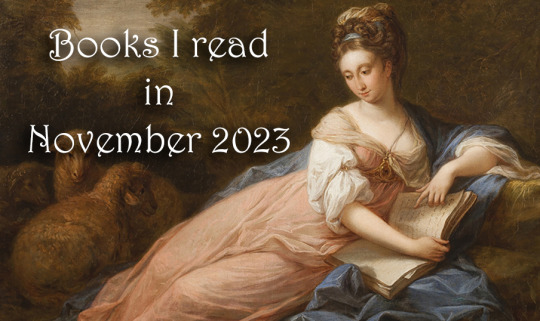
Leia, Princess of Alderaan
Author: Claudia Gray
First published: 2017
Rating: ★★★★☆
In the beginning, I felt this would be simply a decent fanfiction filled with movie references and easter eggs, but I was pleasantly surprised, as I read on, that instead, this turned out to be quite a compelling portrait of a girl who grew up to be the character I loved in Star Wars so much. A very believable portrait. I was also quite captivated that the main conflict here does not center on romance or teenage rebellion, but quite well-measured and carefully thought-through discussion of the prize of an uprising, its importance and difficulty, and the hard choices those with means to oppose the evil often have to make.
The Ethnic Cleansing of Palestine
Author: Ilan Pappé
First published: 2006
Rating: ★★★★★
Sombre, precise, and accessible. Also very important and heartbreaking. A clear portrait of a colonial project that is still brutally taking people´s lives, homes, and history. I still find it extremely bitter that the Zionists took so many lessons and inspiration from the Nazi regime. It is also extremely interesting that the aims, language, and strategies the Israeli government is using in the autumn of 2023 are the same as they had used in 1948. This book is even more terrible now, as we see the genocide of Palestinian people in real time.
The Maiden
Author: Kate Foster
First published: 2023
Rating: ★★★★☆
Interesting take on a real historical event. Lady Christian, accused and deemed guilty of the murder of her lover (who was also her uncle - thankfully not blood-related, but still urghhhh), a professional courtesan Violet, who hopes the said uncle might just be her ticket to a better life, and a bunch of other female characters who all have their agendas, reasons, and hopes, are all linked through ties that are only gradually revealed. In spite of revealing the murder and the death sentence of Christian at the very beginning, the author still manages to take you on a journey where there are unforeseen twists and turns. I personally could have done with less raised petticoats and sweaty fumbling, but at the same time, the grittiness and awkwardness of human sexuality are presented in a way that is very real, but never pornographic or lewd for the sake of it. Definite feminist tones are running through the whole book and I appreciate they do not turn any of the women in the book into a 21st-century robot. No. everything is very real and I am sure that many women will also find the characters relatable in their actions and motives. The book COULD have been shorter and left the same impact, but if you don´t mind slower pacing, you might enjoy this a lot.
The Escape of Alexei, Son of Tsar Nicholas II: What Happened the Night the Romanov Family Was Executed
Author: Igor Lysenko
First published: 1998
Rating: ★☆☆☆☆
Except for reprints of some genuine documents in full (i.e. the request of Dr. Botkin for allowing Alexei´s tutors to be allowed into the Ipatiev house), there is really no value to this publication. The whole first half merely gives some basic historical background, pretty much dismisses the accounts of the executioners as faked (without proof) and then there is a lot of trying to persuade the reader that Alexei lived. this the authors came to believe based on some really low-quality photograph comparison, a privately orchestrated writing analysis, and the fact some dude grows his beard like Nicholas II. The fact that Vasily Filatov was obviously very intelligent cannot be taken into account as proof at all, especially since the writers insist he spoke languages Alexei had never been taught and played instruments Alexei had never been taught to play etc. I also found it extremely weird that they insisted Alexei survived the brutal massacre in the Iptaiev house completely unharmed. This book was, of course, written before the 2007 discovery of the two missing bodies, so perhaps the fact those bodies had been missing in the first grave was just too tempting for the writers to let go of once they were contacted by Filatov. Yet in the whole book, there is not a single suggestion as to the fate of the "missing" sister. What happened to her according to these people? I picked this book up because I am fascinated with the Romanov pretenders and how much mental gymnastics they can go to. I am never disappointed in the amount of de-lu-lu.
And the Mountains Echoed
Author: Khaled Hosseini
First published: 2012
Rating: ★★★★★
Not one story, but many lives tying in together, all of which could have been their own book. This is, actually, one of my favourite types of novels and Khaled Hosseini managed to weave a beautiful tapestry full of sadness, desires simple and complicated, and some hefty moral questions. His characters are all so human that you can clearly see their faults and flaws, some of which are more and some less understandable to the reader, but you can always find something to relate to, care for, or pity in them. I would have wished for an ending more book-ish. But the one we get is not bad. It brought tears to my eyes. One of those books that capture life and that which makes us human.
Dostoevsky in Love: An Intimate Life
Author: Alex Christofi
First published: 2021
Rating: ★★★★☆
As I am writing this, I have only read one short story by Dostoyevsky and read only one of his novels (Crime and Punishment). I suppose I should have read a bunch more if I didn´t want to be spoiled for the rest. I imagine a proper biography on this complicated man could easily be a 1000+ pages book, so one must give credit to Alex Chrisofi for writing just about 200 and yet successfully introducing him to me. His childhood, his experiences of exile in Siberia, his ambitions to become a writer - and of course his loves, his gambling, his moral struggles - none of it is missing, everything has its place and tells enough to get to know Dostoyevsky and rouses interest to read more. As criticism, I might offer several footnotes that do not really connect to the matter at hand, and though compelling, I would be always careful before assigning a specific sentence from the author´s book to a specific moment of their life, because that is nothing but guesswork (even if effective in portraying emotions).
We Had To Remove This Post
Author: Hanna Bervoets
First published: 2021
Rating: ★★☆☆☆
This was short and that is the reason why I finished it. I suppose that is as good a review as any.
The Madman’s Gallery
Author: Edward Brooke-Hitching
First published: 2022
Rating: ★★★★★
Very entertaining, gorgeously illustrated, and left me feeling like truly walking through a gallery. I love Brooke-Hitching´s books, they are filled with funny and fascinating trivia and can point you in new directions of interest. The artworks are listed from the dawn of time up to contemporary times, finishing with a chapter about AI.
Silk Roads
Author: Peter Frankopan
First published: 2015
Rating: ★★★★☆
Money and greed rule the world, have always ruled the world and the West is really great at pretending it has always been the greatest part of the world while selling their souls for the dreams of colonialism. Peter Frankopan says all this in a very accessible way, pointing out both the obvious and providing lesser-known information. to be completely honest though, I do not think I have retained too much new stuff, since there was way too much all at once, but I suppose this book also gave me some good pointers to topics I have previously overlooked. Definitely worth checking out if you are unsure about how the world became such a mess (and actually always has been a mess). Pretty depressing with all the knowledge we have acquired and events that have happened since the publication of this book though.
Mammoths at the Gates
Author: Nghi Vo
First published: 2023
Rating: ★★★★☆
These books are such healing plasters upon my soul. A moment of peace and quiet, silent beauty, emotions that are welcomed and not repressed.
Starling House
Author: Alix E. Harrow
First published: 2023
Rating: ★★★☆☆
Things I liked: the writing, the atmosphere, the creepy old house. Things I did not particularly care about: the contemporary settings, the characters who all just seemed to fulfill a spot rather than actually live in the book. Things I did not like: repetitive situations. Overall I will need to think about this one a bit more before I come to a truly solid conclusion. Some time ago I was not thrilled with the author´s debut book, yet I keep thinking about it. Mabe this will be the same case?
3 notes
·
View notes
Note
I was wondering what if anything you thought of B-mask's P2 analysis on youtube! he brings up points of thematic dissonance about the way the maliks were handed (as well as wishing the interns/the P1 gang were better included which I think we all concur on)
ooh, LOVE a good video essay! i hadn't seen this one before but it was great to have on while i was sculpting this morning. i'm gonna link it here for anyone who hasn't seen it, if you've got the time it's a good watch:
youtube
i'd say i broadly agree with it, although i think the analysis loses me at the end. imo he tries to read in much too literally to the parallels between the Maliks and the real-life case of Tsar Nicholas II/the Romanov family. to me that's always been a much more allegorical reference, and i'd actually specifically point to '60s-era Cold War tensions between the USA and the USSR as a much closer thematic parallel to the whole Maligula thing, which is mentioned but not really dug into properly in the video. (in fact, i think that comparison makes the themes of propaganda in the game much clearer, especially given how the Psychonauts are so clearly American in all but name.) it's a shame, because i think everything else is pretty good stuff, but the last 20-or-so minutes feel pretty weak to me.
the video kind of pulls double-duty as an analysis of PN2's themes, and also a comparison and in some ways a critique of it versus the first game. that's something that i've been chewing over since... basically the moment it came out, haha, because i'm in the exact same boat of someone who's absolutely in love with the first game and doesn't quite feel like the sequel was as good (although it's a fantastic game in its own right and i love it a whole lot). so i'm gonna take this as an opportunity to dump my own thoughts on it! this is gonna get long so i'm putting it under a cut: tl;dr, the conclusion that i've basically come to on the game is that while it's not perfect, Psychonauts 2 is, in my opinion, probably the best possible version of what it is, given the circumstances around it and the nature of it as a crowdfunded sequel to a 2000s cult classic and a clear passion project by everyone involved.
the video brings up three main points of comparison/critique: the visuals, the structure/novelty of the gameplay, and the depth of the ensemble cast. i'm gonna borrow that structure, and then go into a little more of why i think certain decisions and compromises were made. overall, i think there were a lot of difficult decisions that had to be made during the development of PN2, and the more i dig into each one the more it seems like a lot of these decisions were made the only way they could be.
in terms of visuals: i can't disagree that the new game looks absolutely great, although i personally wish they'd gone just a little weirder with it. the stylized ugliness of the first game is one of my favourite things about it, and i know that part of that was due to the low poly count... but i dunno, i think there was still the opportunity to make the designs in PN2 a little less cute and a little more grotesque. it feels like the edge has been filed off, pun intended, and a little of the gloomy gothic feel of the first game is gone. i do love the look of the second game, but i can't help but feel that a little something was lost from moving from the deliberate asymmetry and exaggeration of the first game to something a little more... i guess i'd say 'clean' and palatable.
i can't lie, i think that's kind of a shame! but i also definitely get it, especially from a marketing standpoint. the style of PN1 is deeply mid-2000s, calling to mind properties like The Nightmare Before Christmas (which was cited by Tim as a direct inspiration for the game's artstyle) or Invader Zim (iirc, Jhonen Vasquez is a friend of the studio). there's definitely an argument to be made that that kind of angularity would feel dated in a modern game, and certainly similar games that have recently gotten refreshes (take Spyro, or Ratchet and Clank) have also moved towards a cleaner, cuter, more doe-eyed look. maybe that's just the aesthetic upgrade needed to make the game more appealing to a modern audience. (similarly, i think a lot of the tone shift between the games also has to do with being a product of their time. the first game feels a lot meaner, and the second more sincere, in a way that i think is in service to the shifting conversation around mental health. i think it's appropriate, but i do also miss some of the zingers from PN1, hahaha.)
gameplay: yeah, the lack of innovation in the structure of the mental levels is something i absolutely agree with. PN1 did a fantastic job of making every level feel deeply unique, and tying that into the themes of each level as well (ludonarrative!). even when these levels were a little frustrating to actually play, it always felt in service to what the game was trying to do. take how the Milkman Conspiracy is confusing and convoluted and even a little nauseating to navigate, all deliberately designed to create that uneasy atmosphere; or how Black Velvetopia literally traps players in a loop, constantly being forced backwards and only able to make forward progress in little steps before it all comes crashing back down again, as a reflection of Edgar's anger issues. in comparison, other than the noteworthy exception of Compton's Cookoff, most of the PN2 levels are just 'big platforming area that branches off from a hub'.
but i think the video stops short of diving into what i feel is the reason why some of these levels are less innovative. imo it comes down to the shifting market. 3D collect-a-thon platformers aren't really a thing any more, not like they used to be. the genre feels like it's stagnated in a lot of ways; it's not being innovated upon or moved forward, and it's also not something players are really used to any more. again, i think there's an argument to be made that designing a level that's unique but a little obtuse and clunky (take Gloria's Theater - which is great, but by god does it seriously suck to play the first time round) would be a huge turn-off to a lot of players. i sympathise with the devs feeling like they needed to prioritise a smoother platforming gameplay experience, rather than getting a little weirder with it.
story and ensemble cast - yeah, it probably won't surprise anyone to hear that i really wish the interns had gotten more screentime and depth hahaha. i know not everyone loved them, but also, anyone who didn't love them is wrong. they're the best. give me one million new intern voice lines please now
anyway, i think my biggest critique of PN2 (esp. storywise) has always been that it feels like it has one more cast of characters than it knows what to do with. it introduces the interns and the Aquato family and the psychic 6, and between everything it feels like no individual group is given quite enough focus and screentime and room to breathe to really make them shine. so the obvious answer becomes, hey, why not just cut some of the characters?
but on the other hand, like... think about what this game is. this is a sequel from a studio that really doesn't do sequels (and afaik is never planning on doing another one, certainly not a PN3). this is a passion project 16 years in the making. it's a follow-up to a beloved cult classic, and it's something Tim and the others were only going to get the chance to do once, and from that perspective i absolutely can't blame them for wanting to put everything in it. it's clear the team were bursting with ideas and themes they wanted to touch on and plot threads to resolve and cool new characters to introduce, and this was their only opportunity to do so. in their position? i would've done the exact same thing every single time.
a related point that i see brought up a lot, and that i also agree with, is depth - something that's there in spades in PN1, but feels a little lacking in PN2. i think comparing the interns to the campers from PN1 is a pretty obvious way to compare the two games, and yeah, i'll wholly admit that they're one of my favourite things about the first game. they just make the whole summer camp setting feel so alive. there's a huge amount of depth and care given to them; each one has their own little drama that plays out, and while i think there are a few obvious standouts each of them is still interesting and compelling in their own way. that's the kind of depth that has fans coming back a decade after the came first came out. Tim famously got super sidetracked making MySpace pages for all the campers over the space of a few days so that he could really get into their heads and understand their characters. it's great.
most people who play the first game casually will never see any of that. heck, i barely saw anything from the campers on my first playthrough. it was only on subsequent plays, when i went digging and started diving into the fandom and the discussions, that i realised how much there was. i still find new cutscenes and bits of dialogue and interactions every time i play. hell, the fandom is still digging up cutting-room-floor stuff that suggests there was going to be even more interaction with them. i love that depth, i really do. but is it worth putting that much dev time into something that most players will never see? especially in a game when something as fundamental as the boss fights was nearly cut for lack of time and budget?
actually, cut content is something that's pretty interesting to talk about in itself. there's a ton of stuff that's been discovered through datamining: sidequests (like finding Nona in the forest), stuff from early story beats (like the whole Mentathlon - an early version of Hollis' mind?), a whole Gruloky minigame (which presumably would have helped flesh out the Aquato family), and new mechanics (like Otto's bottled emotions - the lines related to which give what is, to me, vitally important insight into some of the characters. i'm not kidding when i say that Norma's bottled sadness line is load-bearing for like 80% of the way i characterise her, it drives me nuts i swear.) in this cutting-room floor content are glimpses of a game that was even more ambitious - dare i say overambitious - than the final product ended up being. we'll never know how much of it actually had a chance of ending up in the game, and how much was cut early due to various reasons, but...
games are made differently now than they were in the 2000s. an AA title like Psychonauts 2 takes more hours, more manpower, and a lot more money than the original. (this isn't adjusted for inflation, but PN1's budget ended up being $11.5mil; in 2012 a projected Psychonauts sequel was ball-parked at $18mil, and i can only imagine that number's gone up.) like i said, i deeply love the depth of interactivity in PN1. but is something like that really feasible, or worthwhile, in the current climate? PN1 was made on some pretty serious crunch. it was a passion project from a small, dedicated team who worked themselves to the bone on it, and due to a number of factors it ended up being a commercial flop that almost ruined them. for PN2, the team were committed to eliminating crunch, which i think is really laudable, especially given the wider state of the industry. in terms of the scope and the cast, PN2 is broader in just about every way than its predecessor. if that was the decision made in favour of added depth to character interactions that only a small number of players would see, was that the right decision to make?
when i look at PN2, what i see, above everything else, is a series of compromises that were made in order to bring a game that a lot of people really cared about to life as best they could. in a lot of ways, it's nothing short of a marvel that the game exists at all. seriously, before the whole campaign dropped if you'd asked me whether i thought Psychonauts could ever get a sequel, i'd have thought you were playing a practical joke. it was a one-in-a-million shot, and they made it, and i kind of think that given everything Psychonauts 2 is actually a hell of a lot better than it has any right to be. there's a lot of factors to the story of its development - it's a sequel, it's a collect-a-thon platformer that released in 2021, it was crowdfunded, it's a passion project through and through, oh yeah and there was a global pandemic midway through development - and i don't think any of those things necessarily hold it back, but they definitely shape it in ways that i don't think can be ignored if you're talking about the game as a whole.
i don't think it's a perfect game. i don't think there is such a thing as a perfect game. but the more time passes and the more i think about it, i think this is... maybe the only version of Psychonauts 2 we could have gotten? i dunno if it's the best game it could have been, but i do think it's the best Psychonauts 2 it could have been, if that makes sense. and the game that it is is, in my opinion, really damn good.
#psychonauts#psychonauts 2#we had a power cut while i was trying to post this but it's back now#so everybody gets to see my essay on my favourite video game and its sequel! unsurprisingly i have Thoughts#but yeah the video essay's definitely good. i might make a separate post that goes into more of what i see as the Themes of PN2#because i agree w a lot of the video's points but i also think it misses the mark a few times#also would love to hear other peoples' thoughts on this!
45 notes
·
View notes
Text
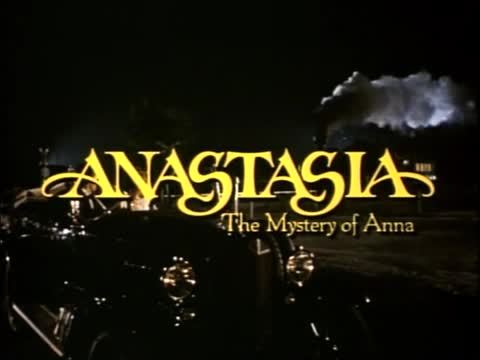
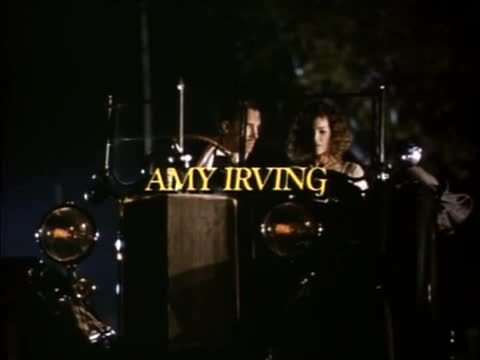

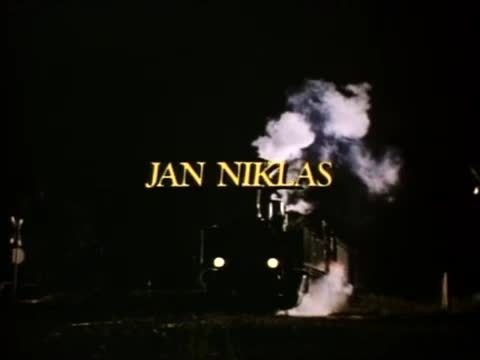
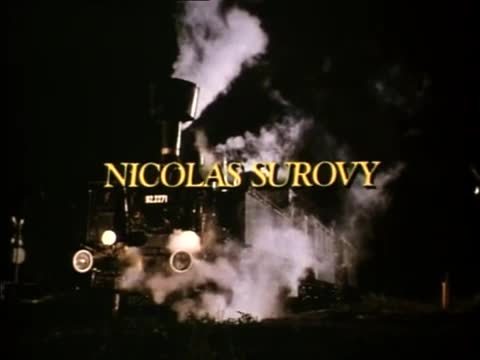
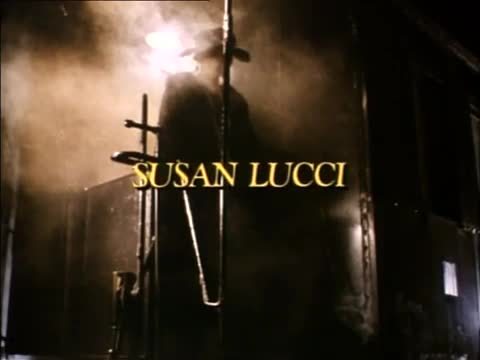
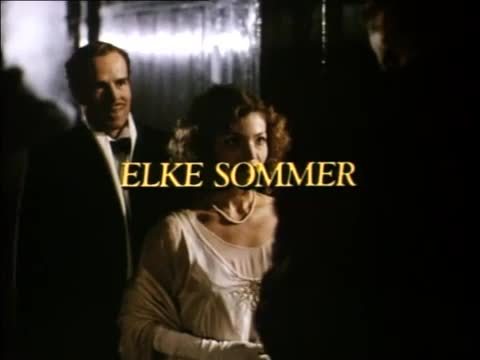
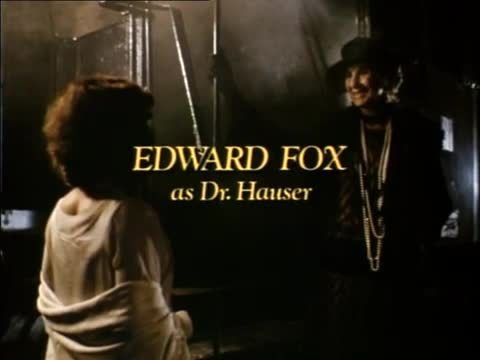
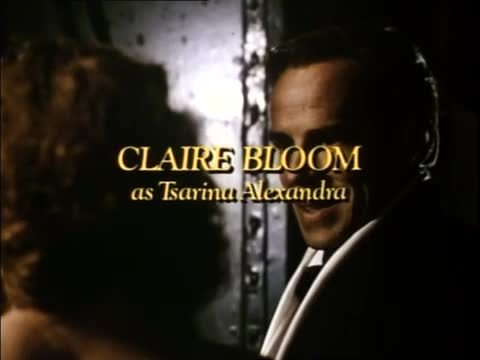
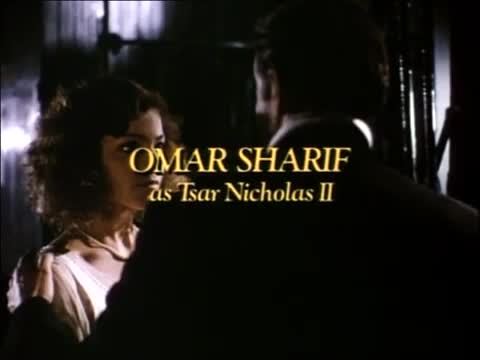
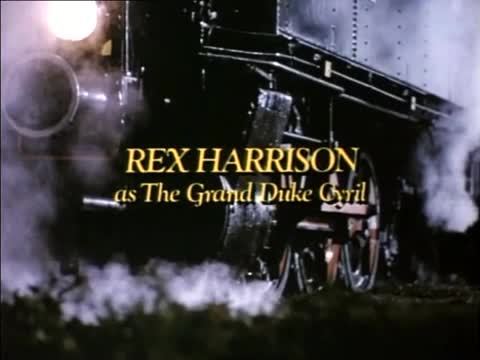

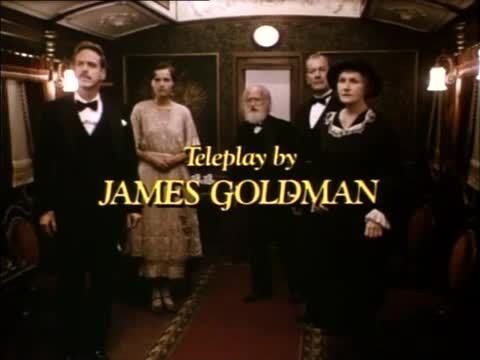
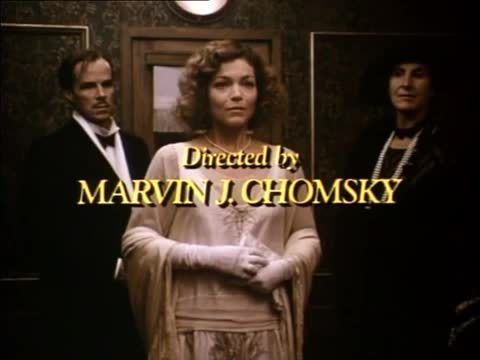

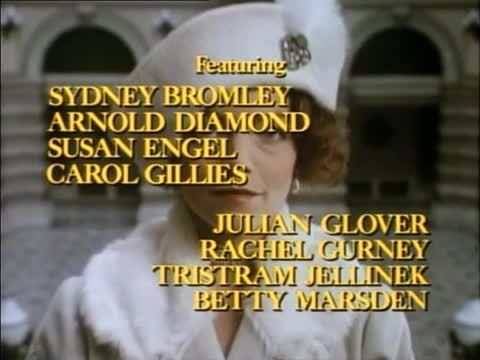
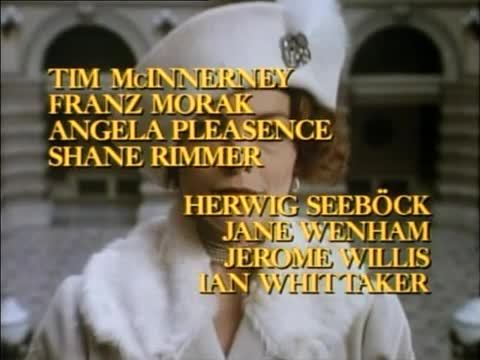
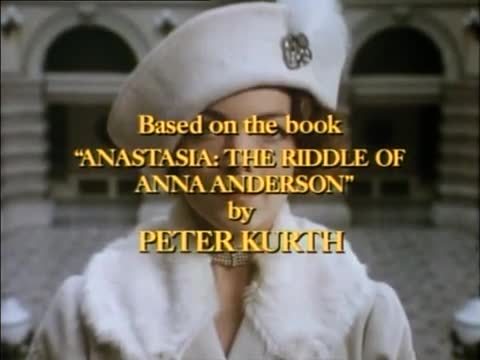
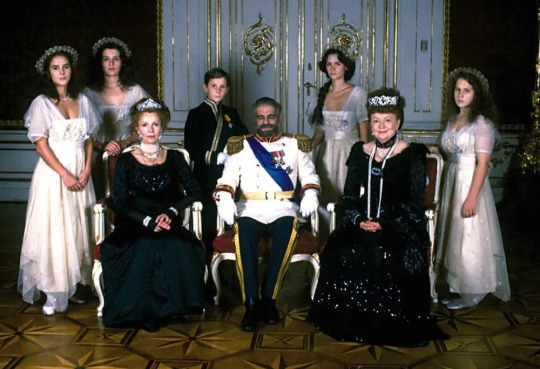
Anastasia: The Mystery of Anna - USA - December 7-8, 1986
Biography (2 episodes)
Running Time: 195 minutes total
Stars:
Amy Irving as Anastasia "Anna" Anderson
Olivia de Havilland as Dowager Empress Maria Feodorovna
Rex Harrison as Grand Duke Cyril Romanov (His last screen appearance)
Jan Niklas as Prince Erich
Nicolas Surovy as Serge Markov
Susan Lucci as Darya Romanoff
Elke Sommer as Isabel Von Hohenstauffen
Edward Fox as Dr. Hauser
Claire Bloom as Czarina Alexandra
Omar Sharif as Czar Nicholas II
Jennifer Dundas as Grand Duchess Anastasia
Christian Bale as Tsarevich Alexei
Andrea Bretterbauer as Sonya Markov
Sydney Bromley as Herbert
Arnold Diamond as Dr. Markov
Carol Gillies as Sasha
Julian Glover as Colonel Eugene Kobylinsky
Rachel Gurney as Grand Duchess Victoria
Betty Marsden as Princess Troubetskaya
Tim McInnerny as Yakovlev
Angela Pleasence as Clara
Julia Koehler as one of the three sisters
#Anastasia: The Mystery of Anna#TV#Biography#USA#1986#1980's#Amy Irving#Olivia de Haviland#Rex Harrison#Jan Niklas
5 notes
·
View notes
Note
I was reading an ask about how its forbidden for first cousins to marry through the Orthodox Church but, if so, then how come they allow cousins to marry? (I.E. Saints Nicholas and Alexandria.)
The Orthodox Church has a lot of rules about marriages between actual relatives and well as 'god relatives' -- godparents are considered like family so you wouldn't be able to marry those people too.
But the nature of royalty marrying other royalty (and royalty naming sometimes dozens of other royals as godparents) means that royals didn't always obey these rules--they're basically all related in some way. There were plenty of second cousin marriages and a few first cousin once removed marriages (Xenia and Sandro, for example) both which technically I don't think the Church allows but for the sake of royal marriages there didn't seem to be a stink made about it.
But Nicholas himself (or Alexander III before him, etc) had to approve these marriages, too, and for him it seemed like first cousins were a hard line. I used the example of Misha and Beatrice before. They were first cousins: Misha's father (Alexander III) and Beatrice's mother (Maria Alexandrovna) were brother and sister. Then you had Ducky and Kirill. She divorced one first cousin (Ernest of Hesse) and then married another one (Kirill Vladimirovich). And they did it without Nicholas' blessing and he punished them for it. Allegedly Ducky and Kirill were attracted to each other in 1891, but Maria Alexandrovna refused to consider a marriage because of the first cousin rule, so it wasn't just Nicky who felt that way about it.
tl;dr: there were lots of rules about marriages in the Orthodox Church but the only one the Romanovs themselves seemed to be strict about was the first cousins rule. Non-Orthodox royal families didn't care about it, though (see: Ducky and Ernest, obviously, but also Alix's sister Irene and their cousin Heinrich).
The German/British side of the family wouldn't have a problem with a theoretical Dickie/Maria marriage, but available evidence suggests the Romanov side would. Second cousins (for example the children of George V, grandchildren of George I of Greece, Frederik and Knud in Denmark, etc) would be on the table, though.
7 notes
·
View notes
Text
肌肉肌腱的彈力

自然不做無用之事。——亞里斯多德
肌肉肌腱的彈力聽起來像是留給運動科學家研究的議題。但其實它對一般跑者也非常重要,任何一位能夠免於受傷的優秀跑者都需要它。
肌肉肌腱的彈力只發生在腳掌與地面接觸時,因為肌肉末端的肌腱本來就具有快速牽張 - 收縮循環的彈性(如附圖)。簡單說,你的身體本來就具有彈性可以在支撐期儲存彈性能,而這股能量可以在跑者離開支撐時轉化成動能。這有點像彈簧被壓縮之後快速向上彈起的現象。
◎ 加入慢跑俱樂部粉絲專頁,設定「最愛」掌握最新體育資訊!
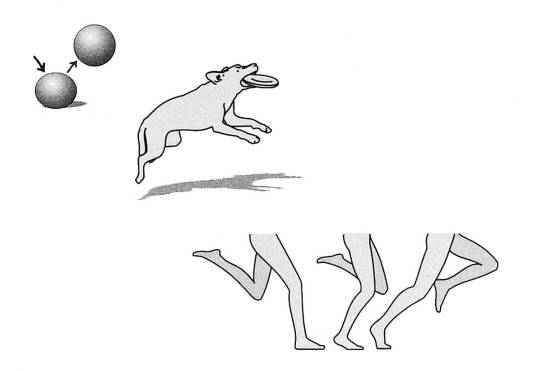
圖-皮球從空中落地後會立即向上彈起。貓和狗也會善用與生俱來的彈性向上躍起很高的距離。我們在跑步時也可以運用同樣的原理,順著重力讓腳掌自然往下落,落地後運用肌肉肌腱的彈力,使腳掌自然彈起、順勢上拉。
移動的效率與經濟性中不可獲缺的重要元素之一正是下肢的彈力。回顧一下第十二章,彈力跟重力與地面反作用力一樣,都被歸類在免費的外力。善用肌肉肌腱的彈力可以節省肌肉的力量。當跑者能妥善運用下肢的彈力之後,同一個配速下的耗氧量與肌肉力量都會下降,這代表跑者在比賽時能保留更多寶貴的能量。
喬治歐.卡瓦尼亞(Giorgio Cavagna)等人於一九六四年研究證實,如果能在跑步時善用下肢的彈力,身體的耗氧量可節省50%。 卡瓦尼亞和他的研究同仁持續透過其他研究強化這項論點,其中一項研究指出, 跑步時的力學效益大於化學轉化給肌肉運動的效率。 ⑵這些研究都在進一步說明:跑者的肌肉與肌腱,在腳掌剛著地時藉由離心收縮(eccentric contractions) 儲存彈性能,接著會快速產生向心收縮(concentric contractions)釋放儲存的能量。
以上看起來有點學術,但事實上道理很簡單。如果你能用正確的技術跑步,就能用更少的體力跑出更快的速度,這比那些單純用肌肉用力的跑者有效率多了。
放鬆與釋放
肌肉「釋放」彈性能的動作是自然發生的,所以最重要的是「放鬆」。要使肌肉肌腱的彈力在跑步中發揮最佳效益,關鍵在釋放的時間與姿勢。如果姿勢不夠正確或觸地時間太長,肌肉肌腱的彈力就會被打折扣。
要有效利用下肢的彈性能,觸地時間一定要短;儘管目前並沒有一套明確的方法可以量化彈性能的大小,但大家基本上對於善用肌肉肌腱的彈力可以提高動作的經濟性已有共識。
當地面反作用力最大時跑者耗費的能量也達到最大,然而此時肌肉肌腱也潛藏著最大的應變能(strain energy),這股應變能來自重力所造成的落下衝擊 。然而研究中並沒有明確指出使應變能提升到最大與縮短觸地時間的理想姿勢。
這證明跑步是一項需要精確控制動作的技巧性運動。首先,重力是跑步力量與效率的主要來源。重力是「免費」的外力,善用它即可減少能量的需求。從力的階層來看,肌肉肌腱彈力的優先順序顯然該高於肌肉的收縮力量,因為效率較高。如前所提,要想在跑步時善用身體的彈性,關鍵在正確的姿勢與時機。
以上所列舉的文獻缺少的是「方法」,該如何才能有效利用肌肉肌腱在落地後所儲存的彈力呢?很簡單。姿勢跑法的設計正是為了使你學會在正確姿勢下利用彈性能,這個姿勢即是「關鍵跑姿」。
善用身體的彈性
腳掌著地時,「肌肉肌腱的彈力」與「肌肉收縮」既分開運作又互為體用,彈力是透過肌肉活動所啟動的被動結果。兩者之間的關係很複雜,也很容易搞混,看起來似乎不相干。雖然肌肉力量可以主動控制,但彈力卻只能被動反應。
所以,在姿勢跑法中該如何善用身體的彈性呢?
答案很簡單,就是把動作簡化到只剩關鍵跑姿→落下→拉起,我們會在第十九章仔細討論這三個元素。在進行關鍵跑姿時,重力這股外力對下肢施加壓力,把彈性能儲存到肌肉與肌腱中,跑者接著向前落下後把腳從地面拉起的一瞬間,這股彈性能將被自動釋放。所以跑者無須主動施加或卸除肌肉上的壓力,壓力的變化只是拉起和落下動作的副產物。
在姿勢跑法中,使用身體彈性的方法,可以歸結到跑者的動作能否精確地達到關鍵跑姿、落下與拉起這三個元素,若可以的話,你只需放輕鬆讓身體的彈性自動發揮功能。
但要強化彈性,你必須進行一些特殊的彈跳訓練。在姿勢跑法的體系裡特別設計了一連串的技術訓練動作,包括轉換支撐、關鍵站姿彈跳、關鍵跑姿跳繩和眾多雙腳與單腳的彈跳訓練,都是在加強跑者下肢的彈性。這些動作可以在第二十四與二十五章中找到。
想要成為一位技術優良的跑者,耐心是最重要的美德。專心訓練這些動作,不要急於求成,讓身體有時間適應與改變,尤其是彈性的開發與強化都需要時間。進步,不會一天就發生。所以,耐著性子練技術動作非常重要。經過一段時間的技術訓練之後,你會發現身體能有效利用彈力的跑步距離將愈來愈長。提高身體的彈性,不論對長跑還是短跑來說都一樣重要。
參考資料:
(1) Cavagna, Saibene, and Margaria. Mechanical work in running. Journal of Applied Physiology,Vol. 18, 1964, pp. -9.
(2) Cavagna, G.A. and M. Kaneko. Mechanical work and efficiency in level walking and running. Journal of Physiology, 1977, pp. 268, 467-481.
(3) Cavanagh, P.R. and R. Kram. The efficiency of human movement-a statement of the problem. Medicine and Science in Sports and Exercise 17, 1985, pp. 304-308.

本文選自 出版社《Pose Method 鐵人三項技術全書》一書。
《Pose Method 鐵人三項技術全書》由國際知名的尼可拉斯.羅曼諾夫博士(Dr. Nicholas Romanov)精心打造,是一本運動技術的革命性教材。以「Pose Method 」為基礎,深刻揭示運動的本質,將重力視為主要推進力,重新定義了游泳、騎自行車和跑步的運動技巧。
書中從基本原理入手,清晰易懂地解釋了運動力學概念,透過大量的實證研究結果和博士多年的教學實戰經驗,呈現了一套獨特的運動教學理論與訓練法。無論你是運動教練或愛好者,這本書都將幫助你突破個人極限,以最有效率、最符合生物力學的方式執行運動動作。
◎ 書籍資訊:Pose Method 鐵人三項技術全書
◎ 延伸閱讀:成功抵抗誘惑後,記得給自己一點獎勵
◎ 加入慢跑俱樂部粉絲專頁,設定「最愛」掌握最新體育資訊!
#Pose Method 鐵人三項技術全書#臉譜出版#尼可拉斯.羅曼諾夫博士#Dr. Nicholas Romanov#約翰.羅伯遜#John Robson#善用重力與運動力學#掌握關鍵姿勢#開發技術知覺#借力使力#效率極大化且不易受傷的科學化訓練全解析#慢跑俱樂部#書籍#book#books#fitness#sports#yahoo#慢跑
0 notes
Text
Send an emoji (or describe emoji) for a starter with your selected muse bc i wanna write but idk where or who exactly.
Canon Characters
👑The Romanovs (Nicholas II, Alix, Olga, Maria, Tatiana, Anastasia, Alexei)
🔫Gleb Vaganov (Anastasia musical)
🌹Lucy Harris (Jekyll & Hyde)
🥀Christine Daae (Phantom of the Opera)
🎻Rookheeya Khan (Susan Kay’s Phantom)
📱Kim Possible (Kim Possible)
👗Wendy Darling (Peter Pan)
🩸Ireena Kolyana (Curse of Strahd)
🗡️ Inej Ghafa (Netflix’s Shadow & Bone / Six of Cro.ws)
🐺Matthias Helvar (Netflix’s Shadow & Bone / Six of Cro.ws)
⏱️Dr. Henry Morgan (ABC’s Forever)
🔬Molly Hooper (BBC’s Sherlock)
Original Characters
📖Liesel Ivanov
🐎Nina Ivanov
🏍️Stefan Ivanov
🍺Ruslan Essen
6 notes
·
View notes
Text
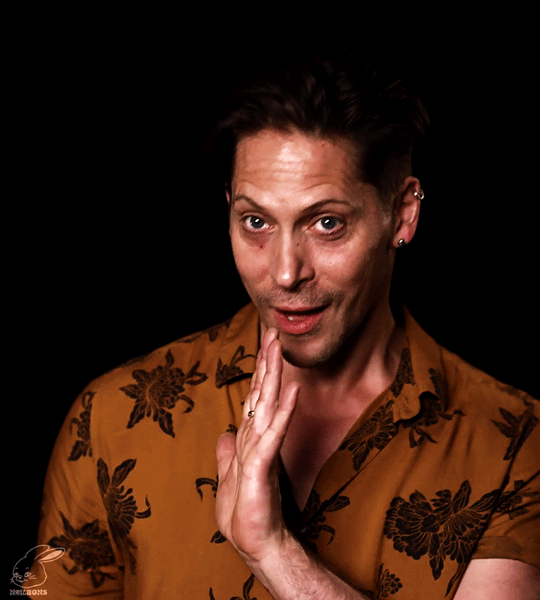
NAME : Dimitri Nikolaevich Graves-Romanov
NICKNAME : Dimi, Riri, Mimi, Niko, Romeo, DR. Graves
AGE : 30
BIRTH DATE : July 17
GENDER : Male
ORIENTATION : Pansexual
LOCATION : Saint Petersburg, Russia { Has homes in several places around the world }
PROFESSION : Streamer, Mafia Leader
SPECIES : Human
SPOKEN LANGUAGES : English, Russian, French
HEIGHT : 6'2"
WEIGHT : 172 lbs
HAIR : Brunette
EYES : Blue
TATTOOS : Several
PIERCINGS : A Few { Upper and lower earlobe piercings, upper, mid, lower helix piercings, forward helix piercing, industrial piercing }
SCARS : A Few
FACE CLAIM : Neil Newbon
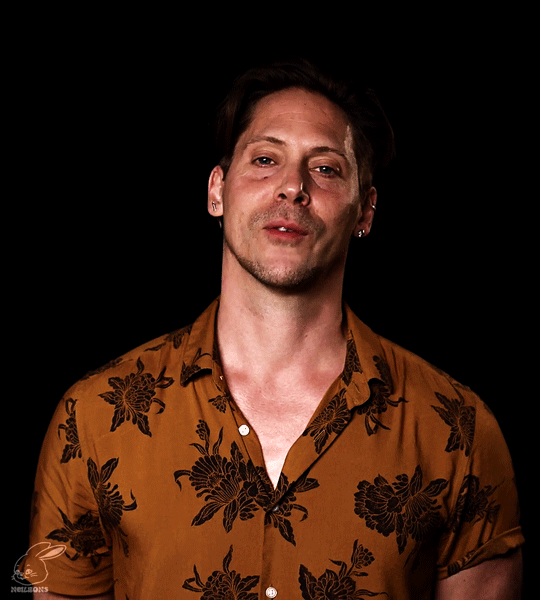
FACTS
Is the rightful Emperor of Russia
Was an edgy angst filled reckless teenager who got into several fights and is still an edgy reckless trouble marker
Knows how to sing
Can play the guitar, electric and acoustic
Has a collection of cars, motorcycles, trucks
Paints his nails
Has studied martial arts
Is adept with numerous weapons
Knows how to change his voice and does it when he needs to
Is like a cat when it comes to affection
No control on what comes out of his lips at times
Comes from a wealthy family and is wealthy even without his family money
Dislikes tea, prefers coffee or hot coco
Likes to sleep in the middle of the bed, prefers the right side when sleeping with someone.
Loves Disney
Can see and talk to spirits
Is fascinated by the supernatural
Can skateboard, loves to skateboard
Loves adventures and loves to explore
Is allergic to cranberries and pineapples
Only cares for a few animals and insects
Hates cockroaches and worms
FAMILY
Nikolai Alexei Romanov - Father
Anastasia Natasha Graves - Mother
Emiko Kasumi Sakurai† - Wife
Akemi Raisa Sakurai-Romanova - Daughter
Alexei Romanov - Paternal Grandfather
Raisa Romanova - Paternal Grandmother
Taisiya Romanova - Paternal Aunt
Luka Romanov - Paternal Great Grandfather
Mika Romanova† - Paternal Great Grandmother
Yuri Romanov† - Paternal Great Uncle
Katya Romanova - Paternal Great Aunt
Leika Romanov - Paternal Great Uncle
Artemis Graves - Maternal Grandfather
Ksenia Graves - Maternal Grandmother
Makari Graves - Maternal Uncle
Damien Graves - Maternal Great Grandfather
Tatiana Graves† - Maternal Great Grandmother
Alena Graves† - Maternal Great Aunt
Samara Graves† - Maternal Great Aunt
Ryusei Sakurai - Father In Law
Mitsuki Sakurai - Mother in Law
Takara Sakurai - Sister in Law
Kosuke Sakurai - Brother in Law
Nikolai Romanov ❪ Nicholas II of Russia ❫† - Paternal Ancestor
Alexandra Fyodorovna† - Paternal Ancestor
Olga Nikolaevna Romanova† - Paternal Ancestor
Tatiana Nikolaevna Romanova† - Paternal Ancestor
Maria Nikolaevna Romanova† - Paternal Ancestor
Anastasia Nikolaevna Romanova† - Paternal Ancestor
Alexei Nikolaevich Romanov† - Paternal Ancestor
CONNECTIONS
Alexsey Solovyov - Best Friend / Second in Command { Has been in love with Dimitri since they were kids }
Maksim Morozov - Best Friend / Third in Command
Iyla Solovyova - Best Friend / Assistant
Ekaterina Morozova - Best Friend / Assistant
Alyosha Raskolnikov - Bodyguard
Artemas Raskolnikov - Bodyguard
Akilina Belova - Bodyguard
Nastashia Makara - Bodyguard { Has a crush on Dimitri }
Kiska Novikova - Capo
Nika Novikov - Capo
Vika Novikov - Capo
Zoria Aslanov - Soldier
Karina Makarov - Soldier
Matvey Orlov - Soldier
Jalena Agapova - Soldier
Mikhail Agapov - Soldier { Has a crush on Dimitri }
Hakoda Kazeev - Soldier { Has a crush on Dimitri }
Anatoli Alexeyev - Soldier { Has a crush on Dimitri }
Sitka Alexeyeva - Soldier { Has a crush on Dimitri }
Niurka Alexeyeva - Soldier
Olya Sokolova - Driver
Jeremie Garin - Driver
Veronika Rostova - Ex Girlfriend
Atsuko Haruki - Ex Girlfriend
Svetlana Karenina - Ex Girlfriend
Rue Nakamura- Ex Boyfriend
Nyx Kinsella - Ex Boyfriend
Kimika Kimura - Ex Boyfriend
Rania Akamai - Ex Fling
Electra Ricci - Ex Fling
Riki Koizumi - Ex Fling
Nikita Nikitin - Ex Fling
Kazimir Rasputin - Enemy { Is Obsessed with the Romanov family }
Norvina Dorofeeva - Enemy { Kazimir's assistant and advisory }
Zathura Alatyrtsev - Enemy { Is in love and obsessed with Dimitri but is jealous of Dimitri at the same time }
Gorky Laskin - Enemy { Zathura's Goon }
Simeon Laskin - Enemy { Zathura's Goon }
0 notes
Text
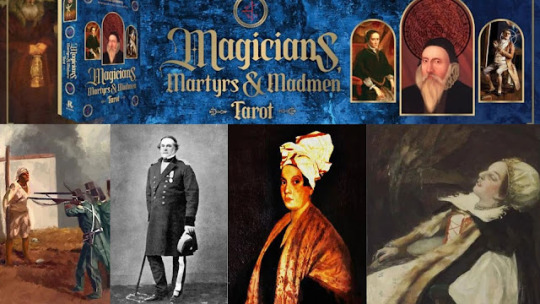
Discover the Magicians, Martyrs and Madmen Tarot Deck
0 - The Fool: James Douglas, The 3rd Marquess of Queensberry Meet James Douglas, the 3rd Marquess of Queensberry, a man characterized as an "imbecile" and "violently insane." Locked away since childhood in Queensberry House in Edinburgh, his life story is as enigmatic as this tarot card.
1 - The Magician: Johann Georg Faust Delve into the world of Johann Georg Faust, commonly known as "Dr. Faustus." He was a scholar and alchemist who made a Faustian pact with the devil, delving into themes of ambition, temptation, and the consequences of selling one's soul.
2 - The High Priestess: Marie Laveau Meet the legendary Marie Laveau, the "Voodoo Queen" of New Orleans, a free woman of color who became a spiritual and community leader through her involvement in Voodoo practices. Her story unfolds in this card.
3 - The Empress: Elizabeth Báthory de Ecsed The infamous "Blood Countess," Elizabeth Báthory, is depicted in all her gruesome glory. Learn about her acts of cruelty and her chilling legacy in this tarot card.
4 - The Emperor: Nero Discover the dark reign of Nero, one of ancient Rome's most infamous emperors. His persecution of Christians and the great fire of Rome are central elements of this card.
5 - The Hierophant: Tomas de Torquemada Tomas de Torquemada, the first Grand Inquisitor of the Spanish Inquisition, stands as a symbol of religious persecution and the fight for orthodoxy. Explore his role in history through this tarot card.
6 - The Lovers: Juliette Bisson, Eva Carrière, Evita & Juan Perón, Sergius and Bacchus This card is a unique blend of historical figures. Juliette Bisson, Eva Carrière, Evita & Juan Perón, and Sergius and Bacchus each bring their distinct stories to the Tarot, encompassing mediums, political figures, and early Christian saints.
7 - The Chariot: Pedro de Alvarado Follow the conquest of Central America and Mexico through the eyes of Spanish conquistador Pedro de Alvarado, a pivotal figure in the history of the Americas.
8 - Strength: Peter Stumpp The infamous German werewolf, Peter Stumpp, takes center stage in this card. His story as one of history's most notorious werewolves is sure to send shivers down your spine.
9 - The Hermit: Edward Kelley Edward Kelley, an English occultist, alchemist, and spirit medium from the late 16th century, invites you into the world of esoteric knowledge.
10 - The Wheel of Fortune: John Dee Explore the mysteries of mathematics, astronomy, and angelic communication alongside John Dee, Queen Elizabeth I's advisor, in this tarot card.
11 - Justice: Matthew Hopkins Meet Matthew Hopkins, the "Witchfinder General," a prominent English witch-hunter during the English Civil War period, as he administers his form of justice.
12 - Ngongo Lutete Discover the compelling story of Ngongo Lutete, a significant Songye leader during the late 19th century, as he rises from enslavement to respected leadership.
13 - Death: Jack the Ripper Unveil the chilling enigma of Jack the Ripper, the unidentified serial killer who terrorized London's Whitechapel district in 1888.
XVIII-THE MOON GREGORI RASPUTIN
Grigori Rasputin, often referred to as Rasputin, was a Russian mystic and confidant of the Romanov family, the ruling family of the Russian Empire. He is one of the most enigmatic and controversial figures in Russian history. Here are some key points about his life:
Early Life: Grigori Rasputin was born in Siberia, Russia, in 1869. He came from a peasant background and was largely uneducated. He worked as a wanderer, sometimes as a religious pilgrim, and later claimed to have had spiritual and mystical experiences.
Rise to Prominence: Rasputin's reputation as a mystic and faith healer spread, and he gained the attention of Tsar Nicholas II and Tsarina Alexandra, who were searching for a cure for their son, Alexei, who suffered from hemophilia. Rasputin's supposed ability to alleviate Alexei's symptoms earned him the trust and favor of the royal family.
Influence on the Romanovs: Rasputin's influence on the Romanovs grew over time. He was often seen as a spiritual advisor and had significant influence over many of their decisions, which led to criticism and controversy.
Controversy and Scandals: Rasputin was widely criticized for his behavior, perceived debauchery, and involvement in political matters. Many Russian nobles and officials viewed him as a charlatan and a threat to the monarchy.
Assassination: Rasputin's influence and scandals provoked deep divisions in the Russian court and society. In December 1916, he was assassinated by a group of nobles who were determined to remove him from the royal family's circle. He was poisoned, shot, and thrown into the Neva River, where his body was later found.
Russian Revolution: Rasputin's murder did not save the Romanov dynasty. The Russian Revolution of 1917 ultimately led to the overthrow of Tsar Nicholas II, the end of the Romanov dynasty, and the establishment of a communist government in Russia.
XX JUDGEMENT - BENDER FAMILY
The Bloody Benders were a family of German immigrants who lived in Labette County, Kansas, in the 1870s. They were notorious for their gruesome crimes, which included robbing and murdering travelers who stopped at their inn, often referred to as the "Bloody Benders' Inn."
The family consisted of John Bender Sr., his wife Elvira Bender, their son John Jr., and daughter Kate. The family operated a small general store and inn, which was conveniently located along the Osage Trail, a popular route for travelers. The Benders would lure travelers to their inn, offer them a meal, and then murder them, often by striking them on the head with a hammer or slitting their throats. Afterward, they would bury the bodies in the garden or basement.
Their crimes went undetected for a time, as travelers often disappeared without a trace, and there were no immediate suspicions of the Benders. However, as more and more people went missing, and rumors of the sinister inn began to circulate, a local investigation was launched.
When authorities searched the property, they discovered several bodies, and it became clear that the Benders were responsible for a string of murders. However, by the time the authorities arrived, the Benders had already fled and were never apprehended.
The Bloody Benders' crimes and their ability to evade capture have made them one of the most infamous and mysterious cases in the history of American crime. The family's gruesome actions have been the subject of numerous books, articles, and works of fiction over the years, and their story continues to be a topic of fascination and horror.
XXI THE WORLD - ALEISTER CROWLEY
Aleister Crowley, whose full name was Edward Alexander Crowley, was a British occultist, writer, and ceremonial magician. He was born on October 12, 1875, in Royal Leamington Spa, England, and died on December 1, 1947. Crowley is one of the most influential and controversial figures in the world of Western esotericism and the occult. Here are some key points about his life and beliefs:
Thelema: Crowley is best known for his role in developing Thelema, a new religious and philosophical movement based on his writings and beliefs. The central tenet of Thelema is "Do what thou wilt shall be the whole of the Law." It emphasizes personal and spiritual freedom, self-discovery, and individual will.
The Book of the Law: Crowley's most famous work is "The Book of the Law" (also known as "Liber AL vel Legis"). He claimed that this book was dictated to him by a spiritual entity named Aiwass in 1904. It serves as the foundational text of Thelema and outlines its core principles.
Occult Organizations: Crowley was a member of several occult organizations, including the Hermetic Order of the Golden Dawn and Ordo Templi Orientis (O.T.O.). He played a prominent role in the development of the O.T.O. and its religious aspects.
Prolific Writer: Crowley was a prolific writer, producing numerous books and essays on occultism, magick, spirituality, and other esoteric subjects. Some of his notable works include "The Book of Thoth" (on tarot), "Magick in Theory and Practice," and "The Equinox" (a series of publications).
Controversy and Notoriety: Crowley's life was marked by controversy and scandal. His libertine lifestyle, recreational drug use, and his public persona as the "Great Beast 666" drew criticism and condemnation from many quarters.
Legacy: Despite the controversies, Aleister Crowley's influence on the modern occult, esoteric, and spiritual movements remains significant. His teachings and writings have inspired many individuals and organizations, and Thelema continues to be practiced by adherents.
Aleister Crowley's life and philosophy continue to be the subject of scholarly study, and his ideas have left a lasting mark on various fields, from spirituality to popular culture. He is considered one of the most important figures in the history of Western occultism.
youtube
Don't miss the chance to add the Magicians, Martyrs, and Madmen Tarot Deck to your collection. Purchase it for £21.75
Your Donations Are Graciously Accepted To Help Me Keep All About Paranormal Online! All About Paranormal is not intended to be for profit, but does carry expenses with domain cost, books, decks, etc. The links I use are affiliate links, I earn a commission for referring you, and the price you pay doesn't change. If you liked my work, please buy me Coffee.


#unboxing#tarot#Youtube#themagiciansMartyrsandMadmenTarotDeck#tarotunboxing#walkthrough#flipthrough#tarotcards#tarotdecks#divination
1 note
·
View note
Photo
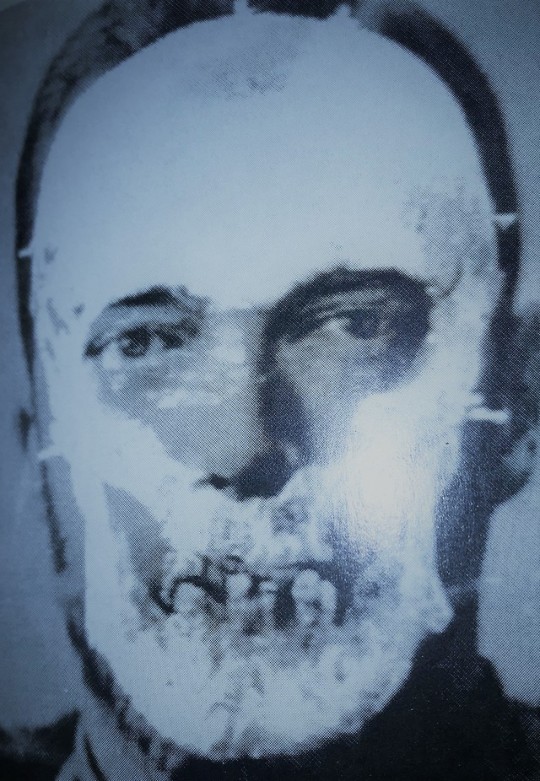
The Romanovs: The Final Chapter by Robert K. Massie
Dr. Sergei Abramov’s superimposition technique: a picture of Nicholas II superimposed on the skull of Nicholas II.
#the romanov family#the romanov execution#russian history#tsar nicholas ii#robert k massie#dr. sergei abramov#romanov photos
2 notes
·
View notes
Note
What is Bondarev (BSB ver) actually like in the novels? In my WIP, I’m trying to be as close to the lore as I can with certain parts, so it’s hard to write in a character that I have no clue what his personality actually is like. Also does he have a full name? Is Bondarev his first or last name? I noticed Herzog has a full name thanks to the Fandom wiki you and Hectab are working on :3
Ask and Ye shall receive. (very long post below with allllllllllll of the stuff you asked for.)
VERY HANDSOME
This was a man who was a sight to behold, handsome and straight, with iron gray hair neatly combed back and styled with hairspray, and a muscular body that was defined and supple. Many would describe him as sexy. The sentry had seen such handsome young officers in Moscow, but this one was too unbelievable. He was actually wearing only military shorts and sleeveless undershirt, sweating in the -10 degree wind. The man fished out a lighter from his shorts and lit it with aplomb, the sterling silver case etched with the words "70th anniversary of the October Revolution".
The sentry could not refuse this kindness and went over to light the cigarette.
"Here you go." The man tossed the lighter to the sentry, "In such a cold place, you need to use aviation kerosene with low freezing point, you should save that for the summer."
The sentry then realized that he still had the unlit lighter in his hand, the man's insight was actually keen to this point. Furthermore, people should be eager to find a warm place to rest at this moment. This also shows that he still has energy left for skiing in such extremely cold weather. The man took out a dark gray officer's uniform from his military duffel bag, and after a few moments, he finished putting it on and solemnly pinned a "Red Flag Medal" on his chest. A minute ago he was a skier, a minute later he had a frown of determination, a young man of power from Moscow.
"KGB Major Bondarev, I'm from Moscow." The man pulled out his papers, "Take me to Dr. Herzog and tell him that this is the moment of survival."
"Yes! Comrade Major!" The sentry saluted.
The man stated his identity in the simplest terms; he was an envoy from Moscow, a key member of the secret intelligence service. In the days of the Tsar, such a man was called a "minister".
********ICE PROOF*************
He pressed the detonator in his hand, after a short dull explosion, the marble base in the snow was blown up, Lenin bronze statue slanted in the snow. The noise of this micro-acoustic thunderstorm was so small that it was muffled by the wind within a few steps. The Black Swan Harbor is notoriously heavily guarded, but the most important aspect is the extreme cold, and standing outside for ten minutes on a night like this can lead to severe frostbite. Because of the blizzard, visibility was less than five meters. The soldiers did not expect anyone else to dare to move outside, and they ignored the fact that Bondarev had an extraordinary tolerance for the cold.
-----
"I sometimes think that people who like to drink can't be bad. So I like you a lot, you know vodka." Dr. Herzog removed the Makolov pistol and handed over a cold glass.
A light struck down from above, enveloping the Doctor and Bondarev. The glass reflected the light, as clear as the most expensive crystal glassware, but it was carved from a whole block of solid ice, pure ice, without any air bubbles, with cornflower patterns carved on the outer wall. The two men gently clinked their glasses and drank the wine in one gulp.
Bondarev played with the ice carved glass: "It's wonderful, the spirits wrapped in ice, as moving as a stunning young woman under the appearance of an iceberg. I think my hands will freeze and to it."
"Usually people who drink from such an ice glass have to wear leather gloves, and only people like you, Major, who are not afraid of the cold can hold it in their hands. It is carved from old ice in the -30 degree strata and also kept at -30 degrees, making it the coldest drinking vessel for the warmest of wines." The doctor said, He said so, but he was also holding the glass with his empty hand, his slender hand was stable and did not tremble at all because of the low temperature.
****** SUPPOSED ROYAL FAMILY and EXTREMELY RICH ***************
"Bondarev, a KGB major, from Moscow, these are the truth. I only concealed from you the name of my great-grandmother, her name was Nastasya Nikolaevna Romanova." Bondarev slowly pronounced this long, awkward name, like a magician reciting a forbidden spell.
The doctor was stunned: "Was it the last royal daughter of the Romanov dynasty?"
Nastasia was the last princess of the Romanov dynasty, the last dynasty to rule Russia until it was overthrown by the October Revolution in 1917. in 1918, the last Tsar Nicholas II and his entire family were secretly executed by the Red Army. Nastasia was the youngest daughter of Nicholas II, and although she was young, she was given the title of "Grand Duchess", which made her more honored than other royal princesses in Europe at the time, and princesses were required to curtsy and address her as "Your Imperial Highness" during their audiences. It was rumored that she was the only one who escaped execution, and that her name Nastasia meant "resurrection".
"Since there is still me, the grandson of the emperor, I can't say that she is the 'last' royal daughter." Bondarev smiled.
"How do you prove yourself?" The Doctor asked.
"I saw Rasputin's signature at the end of the tunnel, and that heretic who had been canonized had been here before, so I should say he was the one who found this cave, right?"
"Yes." The Doctor said, "This cave is his legacy."
"Then you must know that Rasputin was a guest of the Tsar and a close friend of Princess Nastasia. The fact that I could find this place means that I have Rasputin's secrets, secrets that he told my great-grandmother. This is the proof of my status as the last royal grandson of the Romanov dynasty." Bondarev held his head up proudly.
"So, what were the secrets that Rasputin revealed to Her Imperial Highness?"
Bondarev smiled slyly: "I think there are certain things I know that you do not know, and of course there are things you know that I do not, so we might as well exchange information about each other. Then we might be able to sit down and talk about cooperation."
"After you." The Doctor raised his muzzle.
"This matter begins with my great-grandmother's escape. A Red Army bullet did go through her heart and her body was thrown into an abandoned mine, but three days later she awoke and the wound miraculously healed. It was then that she remembered what Rasputin had told her, that Rasputin said he was willing to share the secrets of the world with his great-grandmother because she, like himself, was God's chosen one. Like Rasputin, she had an unparalleled power of life and could even return from hell. She later married a Red Army officer, and in those days the only way she could gain refuge was to marry a Red Army officer. My great-grandfather, who later stepped into the high ranks of the military, was a very good man and always protected my great-grandmother from revealing her identity. Great-grandmother would sometimes wake up in a dream and shout, 'The Red Army is coming with guns,' and great-grandfather would reassure her, 'I am the Red Army, and as long as I live, the Red Army guns will only protect you.'"
"Touching love." The doctor said faintly.
"Great-grandmother decided to give up her past identity, so she rarely talked about the past of the Romanov dynasty, with the exception of one thing. She bade her great-grandfather that there were relics of God in the north of Siberia, which the saint Rasputin had told her about. That saint found the cave where God created life on the shore of the icy sea. But he did not announce it to the world, but sealed the miracle with iron water, because the miracle had degenerated into the cradle of the devil, and inside it were hidden fallen angels. Generations of our family descendants have to be on guard against the reopening of that cave, and the day it reopens, the end comes with it."
"So you are here to check if we are guarding the miracle properly?"
"No, no, my great-grandmother was a good and devout Orthodox Christian, but I am not. I have a great curiosity about everything, and after I inherited the secret, I am bent on finding the miracle. If I were to find it, I would definitely open it and take a look. Not long ago I found an engineering map from the ruined archives." Bondarev drew out the map roll and rolled it along the ice toward the Doctor, "It marks the elevator that leads deep into the tundra."
The Doctor scanned the map, "It's not the original map, someone drew it from memory."
"It was drawn by a madman who used to be the engineer battalion commander of the 13th Konrad Infantry Division and was ordered to participate in the excavation of the tunnel, after which he was brainwashed by drugs and became a regular in a mental hospital. All he remembered was that he was engaged in a big project on the northern coast of Siberia, and the project was to dig a cave. Suddenly I realized I had found a breakthrough. But as the investigation progressed, I found that the matter was becoming more and more mysterious. Many years ago, the army had built a port in the almost unnavigable northern part of Siberia, about which there was no information, and even the coordinates had been erased. Below that port, sappers had dug through the hard permafrost and opened a long-closed cave. So I decided to come and see for myself. As a KGB officer, I easily applied for a charter to investigate this mysterious port, so that I could drive in as the 'Minister of the Admiralty'. Sure enough, I found Rasputin's signature at the end of the passage, and I finally arrived at the place I had dreamed of since childhood." Bondarev looked around, "But it doesn't look like there's anything interesting here."
"I'm sure you noticed when you came here that the closer you got to the door where Rasputin signed, the more bones there were in the tundra, and they all crawled out through a gap in the rock wall. It was those things that Rasputin was talking about when he said this cave would breed demons. But now the cave is dead, and the mysterious forces in the cave have dissipated."
"I don't think so. If this cave was no longer valuable, you would have left long ago."
"If this cave was really valuable, I should have shot you and monopolized the secrets of this place."
"Wait a minute! I have brought you a gift! Won't you take a look at the gift before shooting?'' Bondarev took an envelope from inside his clothes and slid it along the ice toward the Doctor, by which he showed that he had absolutely no intention of resisting.
The doctor tore open the envelope, inside was a Swiss bank cashier's check - a cashier's check for $200 million.
"This is a rare and large check, what do you want to buy from me with this check?" 'Doc asked.
"Not a purchase, just a gift." Bondarev smiled, "We believe this gift will be useful to you. Your research has been going on for decades, consuming huge amounts of state funds every year, and it must not be finished yet, right? But now that the Soviet Union is about to split, your backers have fallen, which means you no longer have access to funding to complete your research, and no one to help you keep it secret."
"It does sound like I'm facing a lot of trouble." The doctor said.
"Then why not work with my family? We know politics, we know technology, and we know war, and we're willing to invest in this cave as long as its secrets pay off. We can continue to support you in this project and share with you all the benefits it brings. I have already shown my sincerity and told you everything I know. Shouldn't you also tell me what I don't know? After that you will still have time to shoot me."
"You are very calm, Comrade Major. You think I won't shoot you if you produce this $200 million cashier's check, don't you?" There was a hint of sarcasm in the Doctor's tone.
"There are not many people in the world who can refuse two hundred million dollars." Bondarev smiled, "And killing me wasn't the best option. If I do not return safely to Moscow, the family will know that something has happened to me, and they will not spare you. At that time the secret of Black Swan Harbor will be made known to the world."
"Ten times." The doctor threw the cashier's check back to Bondarev.
Bondarev froze: "What did you say?"
"Your family needs to increase the bid tenfold. I need three years and two billion dollars to complete this research. At that time we will share the whole world."
"That amount is beyond my expectations and not easy to raise even for my family."
The Doctor laughed coldly: "It seems you really don't know the secret of this cave, in front of which two billion dollars is too small a figure, what is here no one can afford, it is priceless! Your family should be proud to offer this two billion dollars."
"Everything has a price, weapons, women, secrets, even souls." Bondarev said.
"But who can put a price on God?" The Doctor asked.
-------
The Lenin's mooring is only 40 kilometers from Black Swan Harbor, and they will be here soon. This new flare is so great that American spy satellites will recognize it as an aurora borealis." Bondarev said.
"You had said that the Lenin would not come." The doctor said.
"Moscow is not prepared to send the Lenin to Black Swan Harbo, but we can, and now the Lenin is at my family's beck and call."
Black shadows rose above the sea level, the roar of a giant bee on its wings approaching at high speed, snow dust twisted into a tornado by the helicopter's rotors, red five stars flashing in the white tornado. It was the "MiG 26" heavy helicopter, codenamed "Halo", one of the pride of the Soviet military industry. The helicopter hovered over the cast iron dock, the searchlights broke through the haze of the night, the hatch opened, and five captains lined up, saluting Bondarev. The communication lights below the belly of the plane blinked up, signaling greetings to Bondarev in Morse code.
"Glad to see you're safe and sound, Your Imperial Highness!" The doctor read out the greeting.
The fact that they called Bondarev "His Imperial Highness" instead of "comrade" meant that the helicopter and the Lenin on the icy sea were no longer loyal to the Soviet Union, but to the heir to the Romanov dynasty. The name Romanov is about to shine again after almost a century of obliteration in history, and with the power of the Dragons, it is not impossible for them to re-establish hegemony on Earth.
Bondarev handed a letter to the Doctor: "This is a letter I wrote to the family, please read it."
The Doctor scanned it and handed the letter back to Bondarev.
"If things go well, we will be able to relocate within a few weeks." Bondarev handed the letter to a captain who descended down the zip line, "We will build you a brand new research base in the warm and pleasant Baltic Sea, along with a vacation villa."
The captain placed a mouthful of boxes at the doctor's feet, containing a case of aged Red Label vodka.
"A small gift, so you don't have to worry about running out of booze until we leave Black Swan Harbor." Bondarev said.
"I guess I picked the right partner." The Doctor smiled.
***** HE VERY STRONG AND CAPABLE ***********
Bondarev looked alert, his muscles bulging under his uniform. He was a highly trained soldier, capable of breaking a wolf's neck with his bare hands, and had no need to fear this delicate boy, but not daring to take it lightly in the presence of something supernatural, he adjusted himself to a state of immediate danger.
------
Bondarev noticed a transparent figure flashed from his side. It was just a short blink of an eye, a fraction of a second, but Bondarev was trained to the rigors of the KGB and he was absolutely certain it was a person!
-------- IS A HYBRID THAT HAS NO ISSUE KILLING PEOPLE, INCLUDING KIDS ------------
The lieutenant on duty in the boiler room collapsed on the duty desk, a bottle of Red Label vodka still in his hand. A steel-core bullet had penetrated his heart, and Bondarev stood behind the lieutenant with his Makolov pistol.
---
At that moment the doctor heard the wind change behind his head, and the beam of the searchlight struck him. He turned sharply and saw huge black shadows hovering in the air, their rotor blades churning the snow into a flurry. It was Halo, the heavy helicopter from the Lenin, which had ventured to Black Swan Harbor in such bad weather.
"Didn't you say Halo couldn't fly in a snowstorm of this magnitude?" The Doctor froze. Something hard pressed against his back, it was Bondarev's Makarov pistol. One by one, the steel-core bullets pierced the Doctor's chest, tearing the aging heart into a million pieces. The Doctor spat out a mouthful of blood, mixed with fragments of his lungs, which had been destroyed in the process. He braced himself and turned his face to look at Bondarev, his eyes filled with shock.
"You can't complete the research without me ......," he hissed.
"We didn't even try to finish your research." Bondarev's pupils swirled with a gorgeous gold.
"Who the hell ...... are you?"
Bondarev held the Doctor in place and injected him with adrenaline using an air needle, "Hold on one more minute for the most magnificent scene."
The Black Swan Harbor suddenly trembled up tremendously, the sound of a series of explosions spread upward from the ground, but it was not a vacuum bomb detonated in advance, if it was a vacuum bomb, a square kilometer around would be leveled to the ground. A fire rose, and countless pieces of frozen earth spilled onto the frozen sea.
"Engineering explosive mines?" The Doctor asked in a hiss.
"The new engineering burst mines, even 10,000 years of permafrost, as long as the right eye is chiseled can be blown up. Now in a place you can't see, there is a huge hole with a depth of 180 meters, leading to Rasputin's cave, where we will use the laser to cut through the ice and take away the precious collection that originally belonged to you." Bondarev said, "You have been isolated from the outside world for too long to know the progress of engineering, it is no longer difficult to cut through the tundra in an instant today, once I probe its location."
"You ...... want to take that dragon!" The Doctor understood.
"Yes," Bondarev replaced the magazine, walked over to the sled, and fired four bullets into the chests of each of the four children.
The children died without a struggle from the potent hypnotic drug. It was pure carnage.
"You are not the only one who is willing to sacrifice human lives for a great cause." Bondarev pressed his chest in silence for the children he had just killed, looking reverent.
44 notes
·
View notes
Text



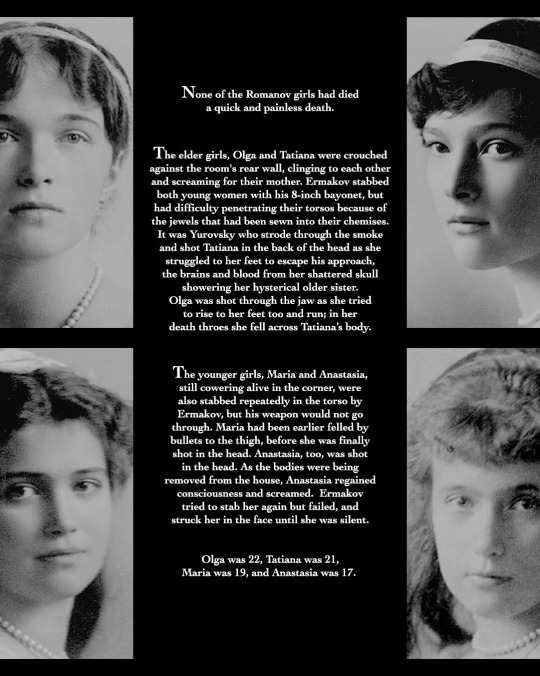



In the early hours of 17th July 1918, the entire Imperial Family along with their servants, were brutally murdered in the cellar of the Ipatiev House.
Around midnight, Yakov Yurovsky ordered the family physician, Eugene Botkin, to awaken the family and ask them to put on their clothes, under the pretext that the family would be moved to a safe location due to impending chaos in Ekaterinburg. They were led in the semi-darkness steep, narrow stairs to the ground floor. Instinctively the Romanovs followed the order of precedence instilled in them, the Tsar in front but refusing assistance as he struggled with the burden of Alexei, who winced with pain from his bandaged leg; then Alexandra leaning heavily on Olga’s arm, followed by Tatiana, Maria, and Anastasia. As they made their way to the stairs, the family paused and devoutly crossed themselves at the stuffed mother bear and her cubs that stood on the landing — a sign of respect for the dead, thinking as they did that they were going to be leaving the house.
Following the family came Dr Botkin, Alexei Trupp (Tsar’s footman), Anna Demidova (Tsarina’s maid), and Ivan Kharitonov (the family’s cook). They all exited the house, re-entering by another, adjacent door leading down into the basement. Nicholas asked if Yurovsky could bring two chairs, on which Tsarevich Alexei and Alexandra sat. Yurovsky's assistant Grigory Nikulin remarked to him that the "heir wanted to die in a chair. Very well then, let him have one."
The prisoners were told to wait in the cellar room while the truck that would transport them was being brought to the House. A few minutes later, an execution squad of secret police was brought in and Yurovsky read aloud the order given to him by the Ural Executive Committee:
“Nikolai Alexandrovich, in view of the fact that your relatives are continuing their attack on Soviet Russia, the Ural Executive Committee has decided to execute you.”
Nicholas, facing his family, turned and said "What? What?" Yurovsky quickly repeated the order and the weapons were raised.
#romanovs#history#royalty#myedits#nicholas ii#alexandra feodorovna#otma#alexei nikolaevich#tsarevich alexei#olga nikolaevna#tatiana nikolaevna#maria nikolaevna#anastasia nikolaevna#imperial russia
991 notes
·
View notes